#it’s called thematic resolution guys
Text
jane immediately recognising that her confidence in rochester is dead after the whole attic wife thing gets revealed — indeed, all throughout their engagement, noticing little red flags about his behaviour, which she wilfully ignores even as the more sensible part of her knows that she needs some form of financial independence, that rochester treating her the way he treated celine varens isn’t going to bode well for their marriage at all…….
i’m just saying. she’s young, but she’s not stupid. there’s a reason they can’t be together until jane’s inherited her fortune and rochester has been humbled by the loss of his financial status and physical ability — indeed, until rochester wholeheartedly embraces a christianity close to jane’s own, which doesn’t resemble the hypocrisy of brocklehurst or the puritan self-denial of st. john.
#rae (re)reads jane eyre#jane eyre#otp: lightning tree#i understand the pop culture joke of jane finding out he had an attic wife and marrying him anyway#but it irritates me more than a little because She Did Not Do That. she found out about the attic wife and got the fuck out of there.#literally ran away in the middle of the night#also i get why people don’t play up the christian themes as much but they are such a MAJOR part of the book come ON#they have no issue with brocklhurst or st john but as soon as it’s jane or rochester their faith and spiritual journeys are just.#never mentioned.#it’s called thematic resolution guys#you don’t have to agree with the politics of it but it’s integral to the plot of the book
246 notes
·
View notes
Text
Okay so I finally watched Good Omens season 2 and have tons of thoughts about it, especially how the minisodes and side-plots do so much work, thematically.
*slaps flashback segment on the roof* this bad boy contains so much subtext!!
And here’s my analysis about some of it:
The side plots are about at least three main themes that I can spot.
1. They are all, in some way, about resurrection. The children of Job. The Nazi Zombies. The resurrectionist. Miracles being rated on a scale of how many people they can bring back from the dead. Even Gabriel, in some way, arriving naked and without his memories and innocent as a babe, then finding himself again was a form of resurrection.
This, of course, has to do with foreshadowing season two, the one where the main plot point is going to be the second coming.
2. They were all about how much it’s a bad idea to mess with humans. All flashback minisodes either had someone die directly because Aziraphale and Crowley were around (Wee Morag, the guy at the magic shop), or almost die because Heaven and Hell said so (Job’s childrens). In present-day time, Aziraphale’s messing about with people during the ball is explicitely called out as creepy and wrong and Nina & Maggie have a talk with Crowley about it.
This leads to my theory that this is also going to be a major theme in the third season. We know that in the book, Adam explicitly tells heaven and hell to stop interfering. We also know that in the show, Aziraphale and to a smaller extend Crowley need to learn this lesson.
I also think that the resolution of the next season is probably going to involve Earth being marked definitely off limits to angels/demons, possibly via the same mechanism that makes the shop into a safe heaven you need to be invited in (and the same thing became true of the Bentley once Aziraphale claimed it! As pointed out here , Shax had to hitchhike to get in, instead of appearing inside as she did before). Earth needs to be claimed. I think that this will happen either by a combined miracle of incredible proportions from both Crowley and Aziraphale after they reunite, or (and this is my pet theory) by a combined miracle of incredible proportions by Adam and whoever is the new Jesus (I am a greasy Johnson truther lol). This would make Earth a place that you need to be invited in order to go there, and therefore safe haven for angels and demons who promise not to cause trouble.
3. All of the side plots and minisodes are about misdirection. Sleight of hand. Smoke and mirrors. Magic tricks. Showing one thing while something else is true.
This is shown obviously in the Job part and also in London 1941, with the party who is getting tricked being heaven and hell, respectively. Meanwhile, Gabriel and Beelzebub are trying to trick everyone. But who is tricked by the plot lines of Nina/Maggie, and Elspeth/Wee Morag?
We are. The audience is.
It has been pointed out here and here that Nina is meant to make us think she’s a parallel to Crowley when she is actually more of an Aziraphale thematically, and vice-versa.
But what about Elspeth and Wee Morag? We have one that robs graveyards, and one who tells her that is wrong and is worried about her eternal soul. That seems straightforward enough as a mirror to Crowley and Aziraphale, no? Well, let’s just look at what they’re doing and saying to each other, shall we?
“Don’t do this incredibly wrong and dangerous thing. It will have repercussions that you can’t even begin to understand right now.”
“I’m doing this for you! You deserve better than this life!”
“I don’t want the better life you’re offering. I would rather huddle with you here, homeless and poor but knowing you’re safe and that we’re together, than to know you alone out there doing horrible things you’ve convinced yourself you need to do.”
“I do need to do it. Trust me! This is going to fix everything! And if you don’t want me to be alone, then come with me. There! Problem solved!”
(Problem very much not solved.)
Doesn’t this sound, a tiny little bit, like a certain season finale to you guys? Elspeth was, in fact, Aziraphale all along. She thought she knew what was best, and she barrelled along without listening to anyone else, and then it went horribly wrong.
There is a reason why both times this season that we see Aziraphale fucking up someone else’s plan (the corpse to sell, Crowley’s contraband whiskey) because he initially reads it as a bad thing and thinks he’s doing good by destroying it, without having the full context, it backfires on him and then the situation has to be fixed. He needs to stop and understand things properly before taking actions. He needs, in short, to ask questions.
We see that the one time he did ask questions before acting was during the whole Job thing, and it worked out the best out of all the sub plots this season, right? … except that Aziraphale was convinced that he would Fall for his actions there. The way Crowley had fallen for asking questions.
And if the only person whose assessment of the situation matches Aziraphale’s is a demon, if the only one who is doing what he personally thinks is the Right Thing is a demon, then gosh… either that means that Aziraphale himself should therefore also be a demon, OR it means that Crowley shouldn’t be one, and this was all just one big misunderstanding, and maybe if I just speak to the manager…?
#good omens#good omens spoilers#go2 spoilers#go 2 speculation#good omens meta#meta#good omens season 3 speculation#good omens season 2#good omens season 2 meta#good omens analysis
819 notes
·
View notes
Text
volume 0 of jjk is more important then you think
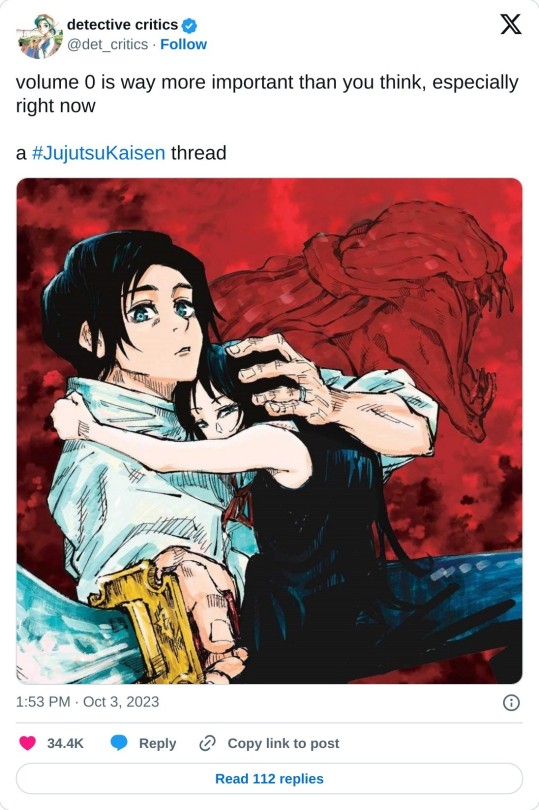
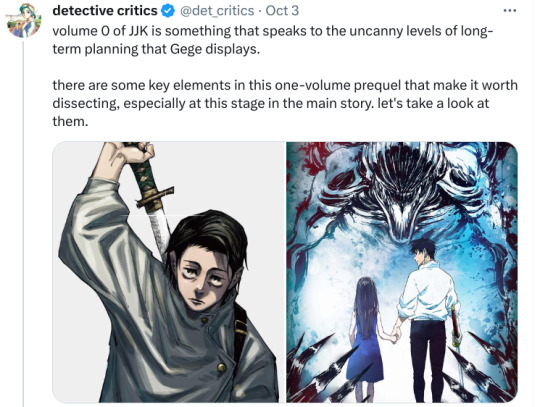
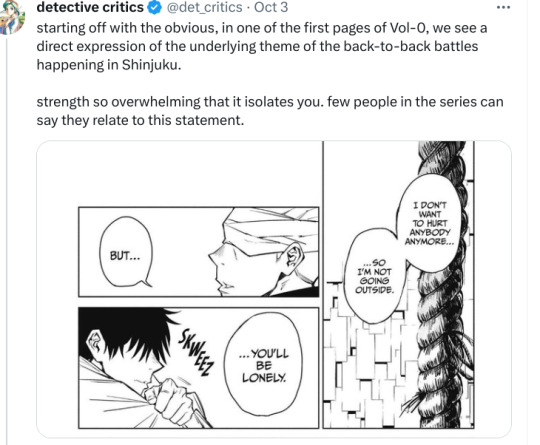

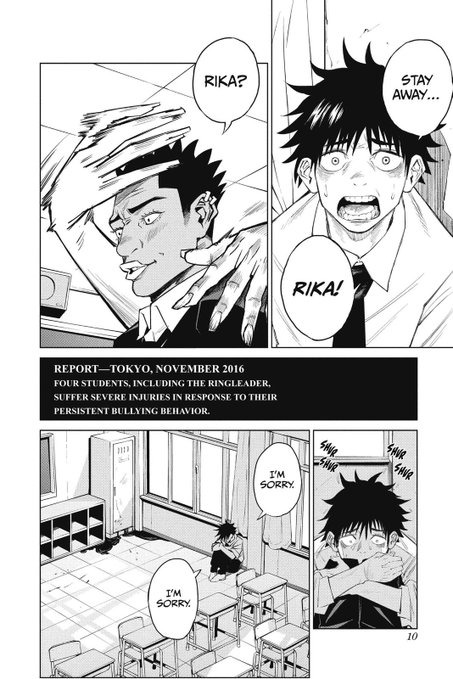
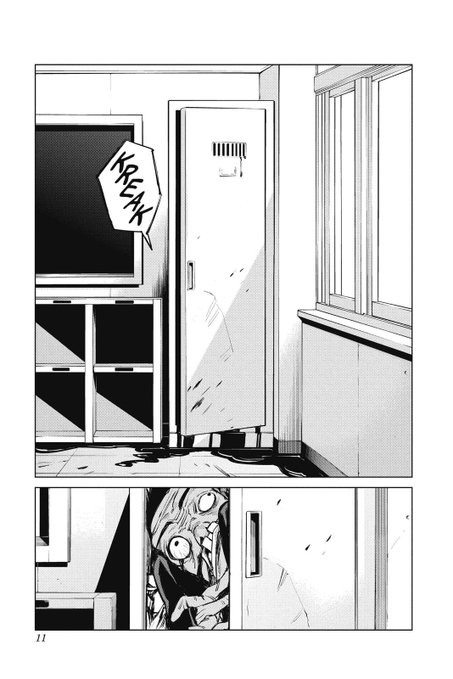
because the idea that a burdensome level of strength is nothing but a curse, is literalised with Yuta. Rika is literally a curse that's formed out of love. this same plight is not as apparent with Gojo Satoru and Kashimo Hajime. with these two, their mannerisms say far more.
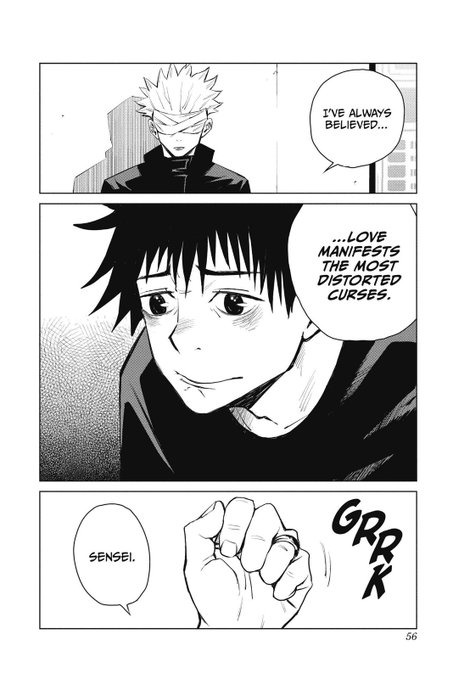
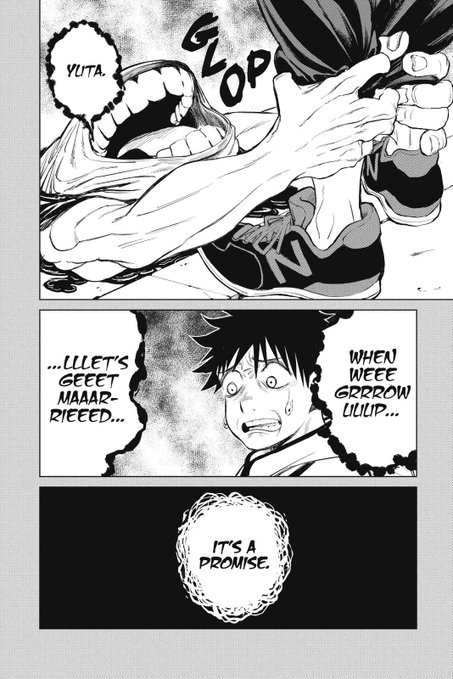
what's noteworthy is that the resolution of Gojo's own crisis is 100% opposite of how Yuta's was resolved, and it looks to be the same for Kashimo as well. Yuta forgoes his overwhelming strength by dispelling the curse on Orimoto Rika, and prioritizes his bonds with his people.
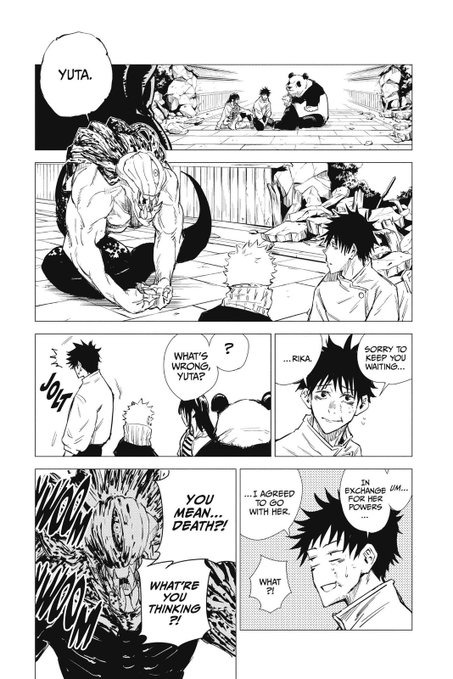
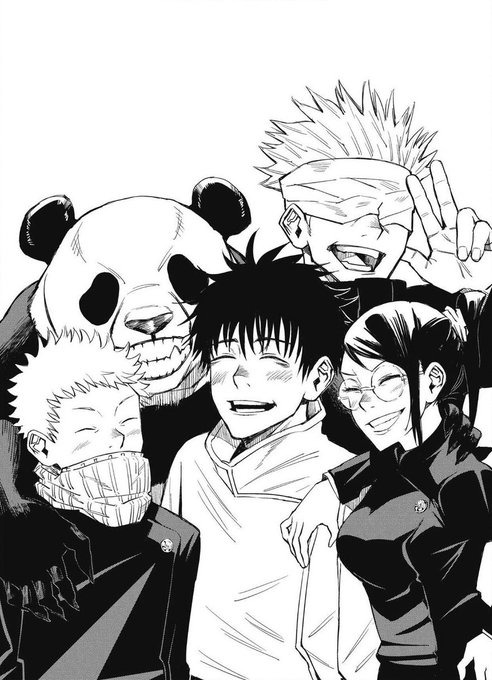
after all, that's the central theme of volume 0. as such, the most interesting thing about the shift between the prequel and the main series is just how COMPLETELY the main series contradicts the themes of the prequel.
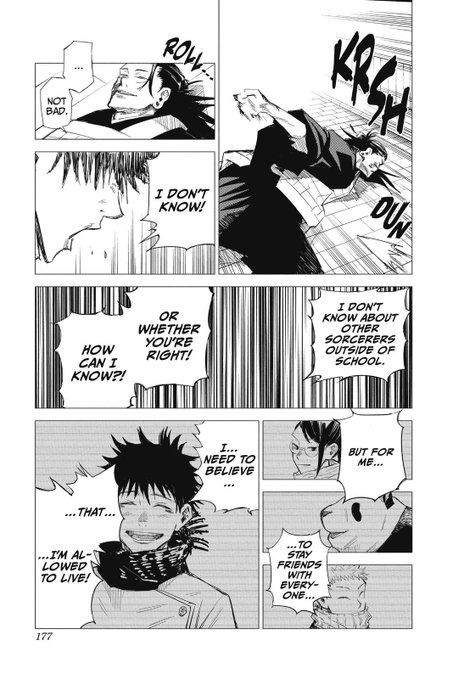
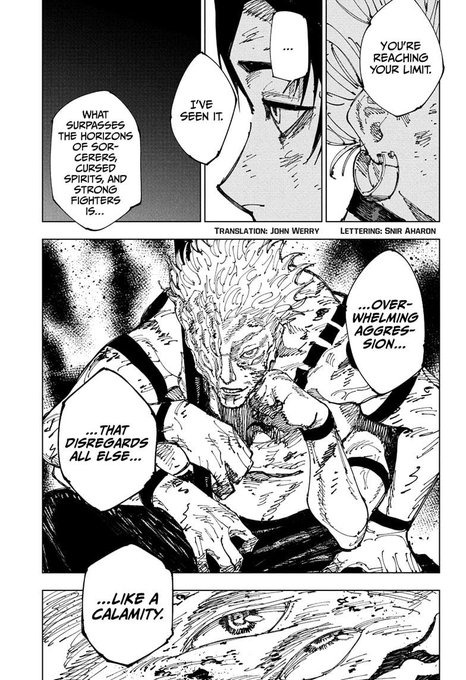
the main series, so far, has severely punished anyone that prioritizes their bonds over a robust sense of self + selfish pursuit of power. the special grades are the best example of this. Tsukumo Yuki worked with Tengen and Choso; she didn't fight with her own domain.
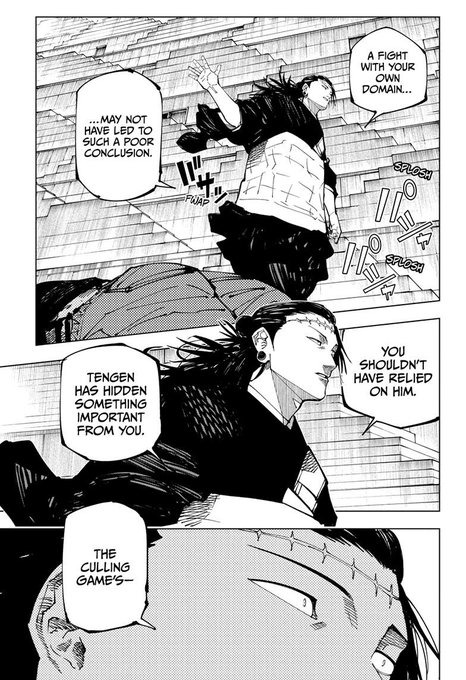
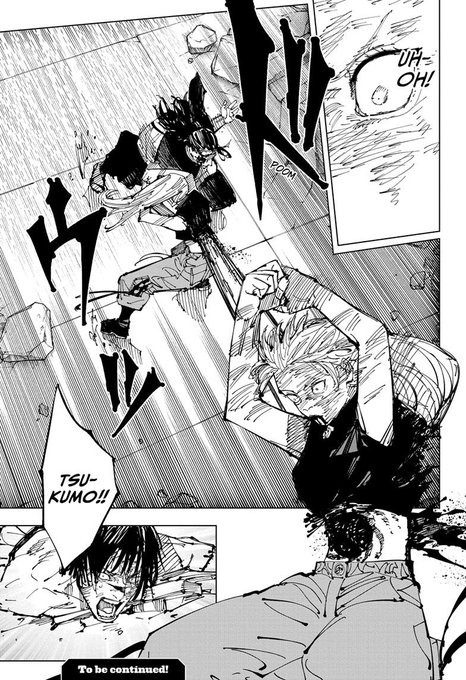
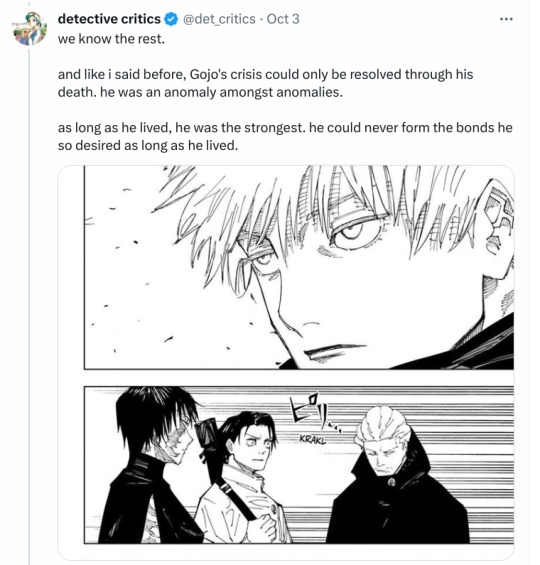
only in death could he stand on an equal footing with his comrades. the framing of these demises in the main series is so deliberately opposed to how the thematic framework of JJK 0 functions. and the reason is none other than the King of Curses, Ryomen Sukuna.
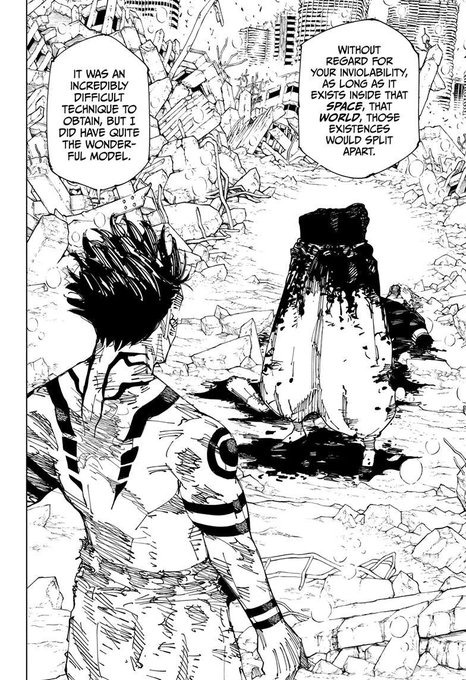
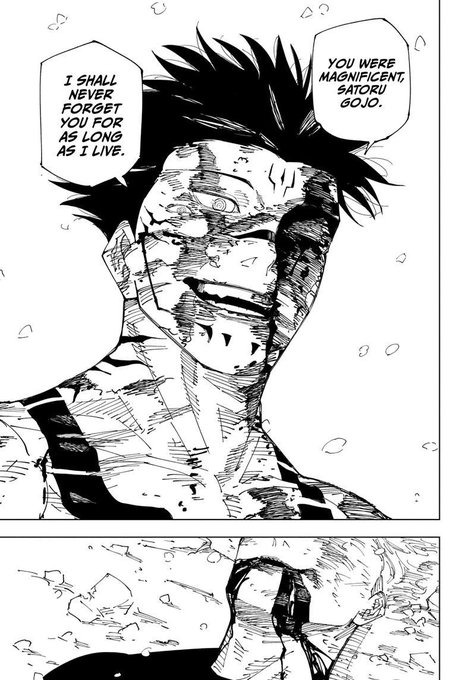

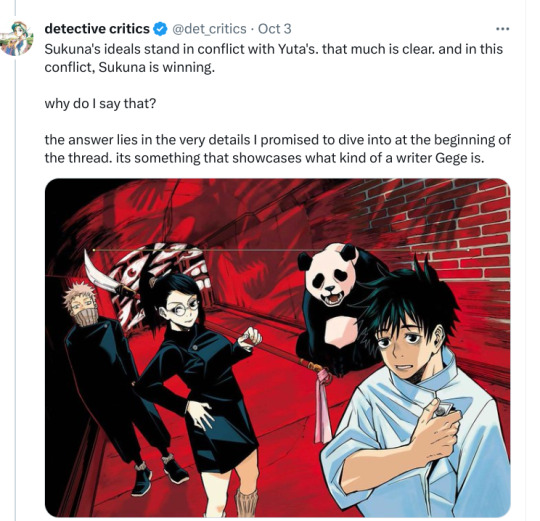
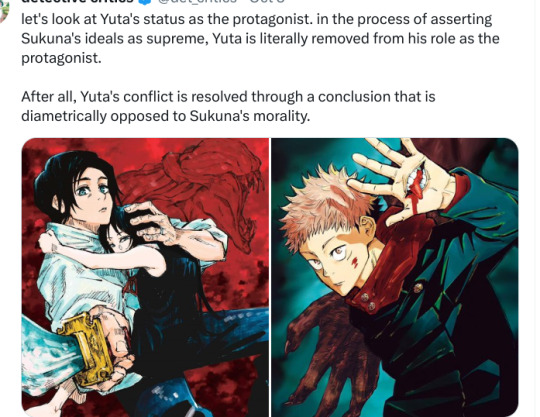
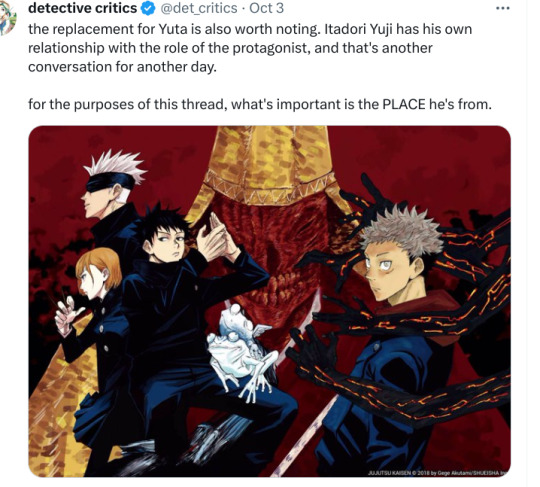
Sendai, the City of Trees. established in the year 1600 by the daimyō Date Masamune. Date Masamune was a descendant of the Fujiwara. any JJK reader knows the significance of the Fujiwara clan in the series
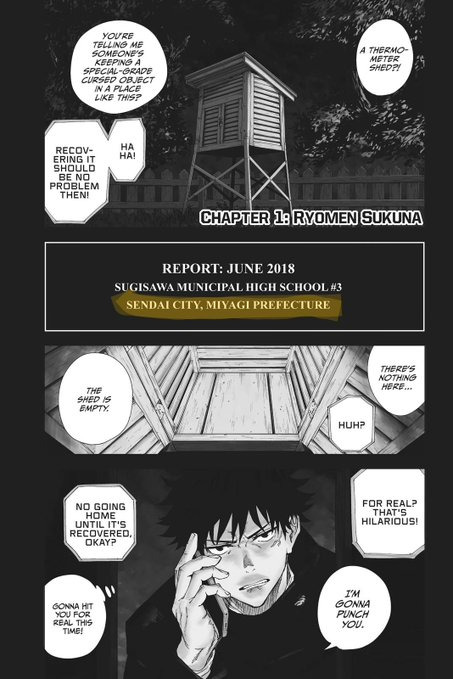
the emphasis JJK gives to the Fujiwara cannot be understated. lemme run through some key examples rq. the turning point of the series, the Shibuya incident, happens in the vicinity of the Meiji Jinguu, a shrine dedicated to Empress Shōken, a deified member of the Fujiwara clan.
the revival of the Heian era, which saw the supremacy of the Fujiwara clan in the political scene, also plays a part in this. Onmyōdō, or sorcery, was at its peak in the Heian era. Ashiya Dōman, one of the most prominent sorcerers in history, was a hiree of the Fujiwara.
and this specific fact is called back to in the New Shadow Style: Simple Domain, developed by Ashiya Sadatsuna, being utilised widely in the series. the relevance of all this to the topic at hand is that Yuta is a descendant of the Sugawara clan.

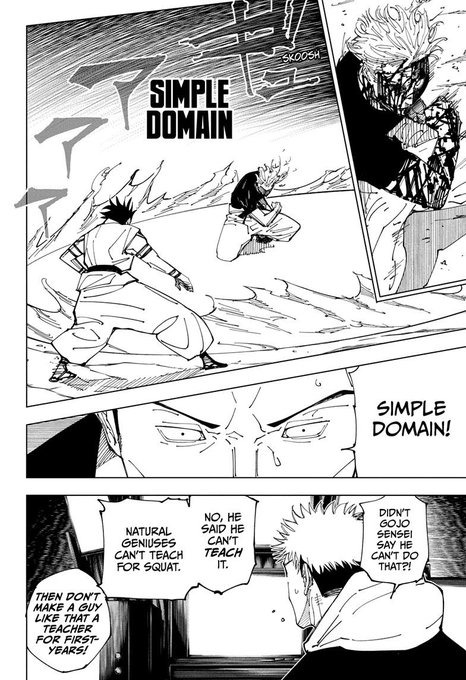
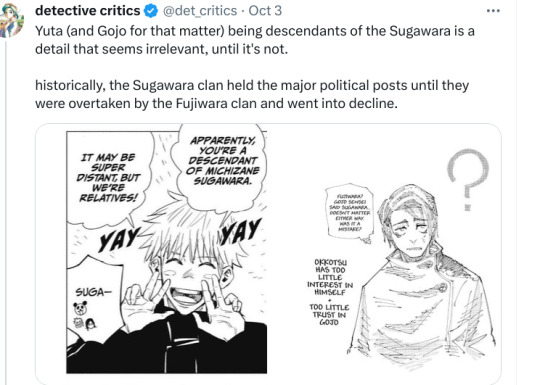
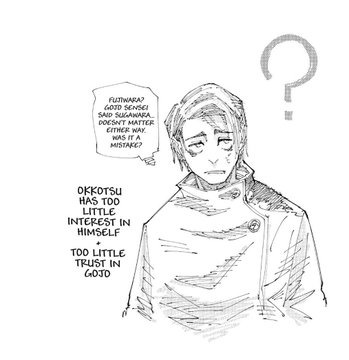
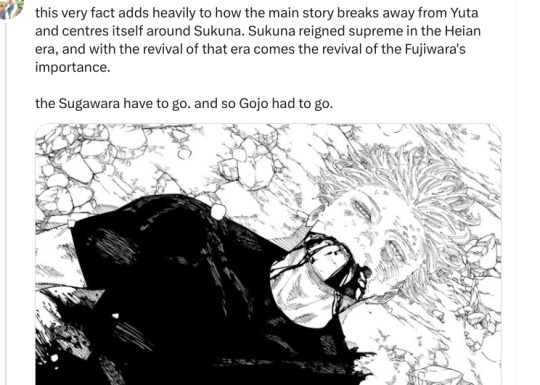
symbolically, literally and meta-textually, Yuta is removed from a position of importance, and a guy from a Fujiwara-established city replaces him.
all of this is why some wouldn't feel confident about Yuta continuing to be in good health for the rest of the series 💀🚩
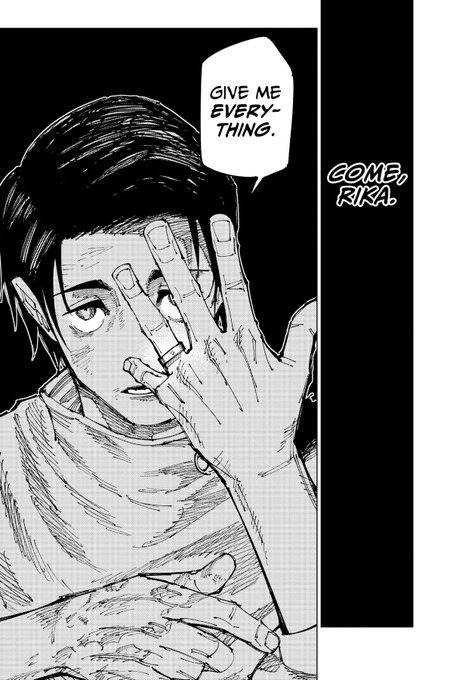
all the special grades in the series have been murked, except Yuta. you can clearly see why people would think he's next. BUT NOT ME! and here's why: in the Sendai colony, i.e. in the same city established by the Fujiwara, he beats Uro Takako, a hiree of the Fujiwara.
he cyclicality that JJK is obsessed with plays out on various levels, but Yuta is the only exception. and I mean the ONLY exception. not even Gojo was exempt. Yuta, a Sugawara, beats someone that was associated with the Fujiwara. it plays out the opposite of how it's meant to.
in conclusion, i think we should put our stocks in Yuta. someone that won't be the next Gojo Satoru sounds about desirable rn. Vol-0 is a treasure trove of hints when we reread with new context. i hope i gave you new insight, or at least a fun read.
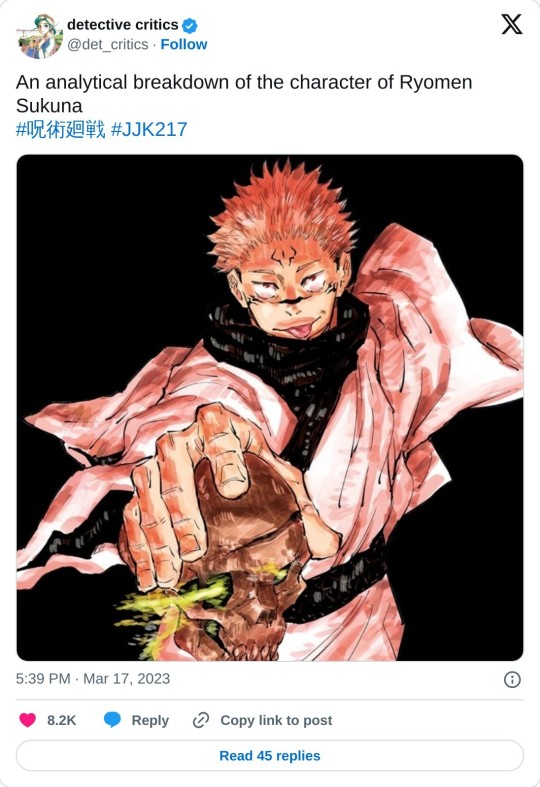
"
I can’t wait for Yuta vs Sukuna, the themes of strength, loneliness, love and modernity vs history finna clash like crazy
The Queen of Curses vs The King of Curses 😤😤😤
Furthermore Yuta as the previous MC whose succeeded despite contradictory themes with Sukuna…
"
64 notes
·
View notes
Photo
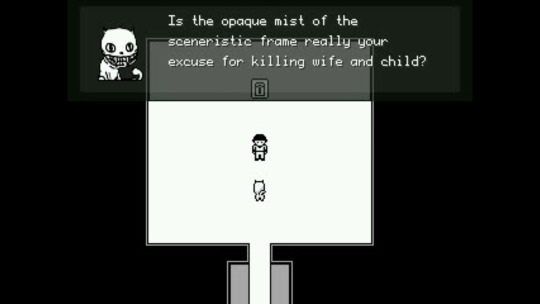
Okay, so like, I love Undertale to bits, but it does often rub me the wrong way when people use it in comparison to games like OFF, which condemn the Player’s violent actions without actually offering the option for a Pacifist resolution, like “well, Undertale is Objectively Better because there’s an actual choice to be nonviolent so it can actually condemn the player in a meaningful way”.
Especially with OFF, I think. Cause while many people consider it a predecessor to Undertale, their themes and the way they relate to their “What the Hell, Player” moments are very different, I think. And this attitude of judging them purely on whatever they’re effective at making the player ‘feel bad’ about their actions is really reductive for what both games are trying to do with these kinda moments.
Like, in general it’s super frustrating when video game moments discussing morality and player-player character relationships are evaluated purely in the sense of ‘are these games justified in Making Me Feel Like a Bad Person’. That’s usually a super-reductive way to look at video game morality. And I really don’t think it helps the discussion to frame “What the Hell Player” moments as an actual personal attack or attempt to evaluate your IRL morality.
And specifically with OFF, I feel like it’s actually very thematically important that the game only has one ‘Route’ and that it is the ‘bad’ one. Because OFF, in my reading at least, is a game very much about narrative framing. Like, that’s the whole thing with the Batter not actually transforming as his Special Ending Monster Duckie Form.
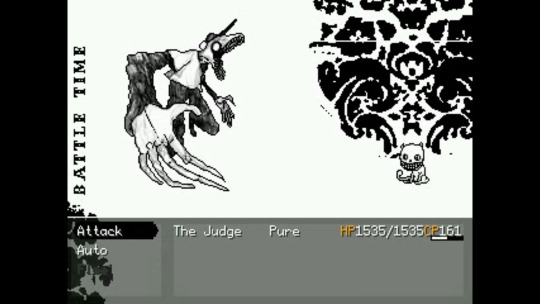
The Batter didn’t change, our point of view did. When we’re controlling the Batter, it is his POV that we’re seeing the world through - and in his POV he’s just an ordinary guy doing the right thing. But if we take the Judge’s side, we’re also taking on his POV. And the Judge, much like any other victim of the Batter, sees him as some sort of monster.
And that’s like a huge theme in the game. While there’s probably no POV that makes the world of OFF like an actually good place to live, it is important to note we are viewing it through the perspective of someone who has already vowed to destroy it. I know a lot of people look at the difference between the Guardians as they are in the Room’s Chapter 4 and the Guardians as the Batter face them as a matter of a personal change between then and now - I think the matter of different perspectives also plays a part.
In the Room we are viewing Dedan, Japhet and Enoch through the eyes of an innocent child that is desperate for companionship and sees them as friends - in the rest of the game we are viewing them through the eyes of a man who sees them as obstacles in his holy mission and upholders of a world that must be destroyed. Neither of them can give a truly unbiased perspective when it comes to the Guardians.
And despite the game making it explicit that the Batter is as a puppet controlled by the Player - although the Player is the one who give the Player Character power - it is the Batter who manipulates the Player into aiding him on his mission by framing it in a way that is more palatable. Despite all the power the player supposedly holds, the Batter holds the power over the narrative framing, and that’s enough to let him take control.
That’s why there’s really no choice in the game but keep helping the Batter along his ‘Holy’ mission - him being able to influence our framing also means being able to influence the options we can see. It is the Batter who wants us to see a world where his violence and destruction is the only possible solution. And the point of the Judge calling out the Player for continuing along the Batter’s set path (rather than stopping the game and turning it off) isn’t just to Make the Player Feel Bad for doing what they need to do to, like, see the whole of this well-crafted story....
It’s to make the Player self-reflect. When did they first had the inkling that the Batter isn’t on the up-and-up? If (‘if’ bring the keyword here) it was all real, when would the point where continuing to aid the Batter would be morally inexcusable? By the point the Batter is beating a defenseless child to death it’s pretty darn clear that We’re the Baddies, but did the Player process any of the hints beforehand? Just how much sway did the Batter’s framing of the world and the narrative hold over the player? And how this is different and similar to how the Player normally engage with other narratives, especially other RPGs?
There is a reason, after all, why the Judge big speech at the end is also about how felt deceived and tricked by the Batter’s words. His feelings are meant to be a reflection of a Player’s on some level.

And despite ‘calling-out’ the Player, he does make it clear he also sees himself as culpable of aiding the Batter in his henious actions. The Player and the Judge’s situations are somewhat paralleled here.
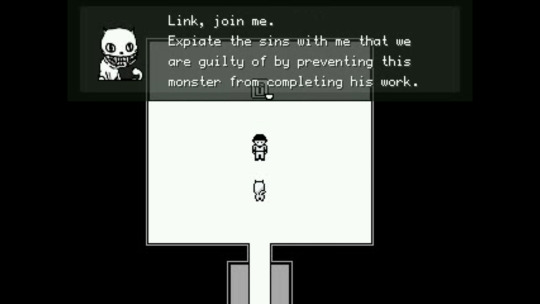

And it feels very notable that the Judge starts out explictly addressing to the Player much more than the ‘Puppet’:


And by the ending of the game, although he does call-out the Player to, he’s got a lot more to say to the Batter as well.

I think it’s because he also underestimated the power the Batter had as a ‘Puppet’ of the Player, up until he realized how he managed to manipulate both him and the Player (although he still sees both himself and the Player at fault for falling for it and helping the Batter).
I think the main point here is to try and make the Player think more critically about the narratives they engage with. In many ways, the Batter is the concept of the RPG protagonist dilluted to its logical extreme. He was literally brought into existence just moments before the story started, and his only purpose in life is to defeat all the bosses, ‘finish’ all of the areas and then just turn the game OFF. That’s also why siding with the Batter is considered the ‘canon’ ending of the game, in this allegory it is the ending that correspond most to Regular Player Behavior.

It’s trying to make you think about how different POVs and narrative framing can be used to change the way we view a story. If the Batter can skew the lens we view the story enough so that it makes us side with him… how other forms of media, and in this case espacially other games can convince us that the protagonist’s actions are justified and heroic? Is there some ignored angle in this and that game, some ignored ‘Judge’ of sort, that would totally reframe the supposed morality of the story?
I think that’s the main thing, or at least one of the main things, one is supposed to get from OFF. Not just a blanket sense of guilt for all the made-up pixels you killed in this game or other games, but an invitation to try and examine the stories you play from more angles, and think more of the narrative tricks that can be used to justify morally dubious actions. For this to work, the game has to work in tandem with the Batter and his POV for the most part. And because of all of this, I believe OFF’s lack of a ‘moral choice’ system does not take away from its central points and actually helps them. The only choice comes when the Judge barges in and offers a counter-narrative to the Batter.
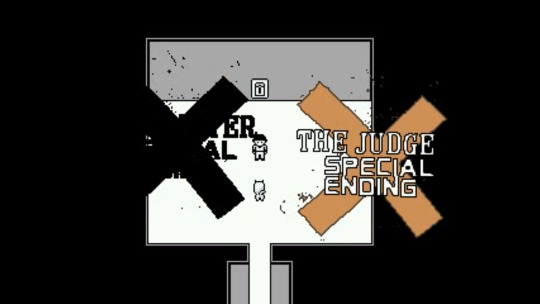
Undertale, in contrast, is a lot more about Player Actions and Player Agency. Like, Chara and a Murder-Route Player have essentially a reverse dynamic from the Batter and a Normal Ending Player. With the Player convincing the Player Character (?) into the viewpoint that the world exists just to be drained of Content before turning it Off and moving on to the next one.
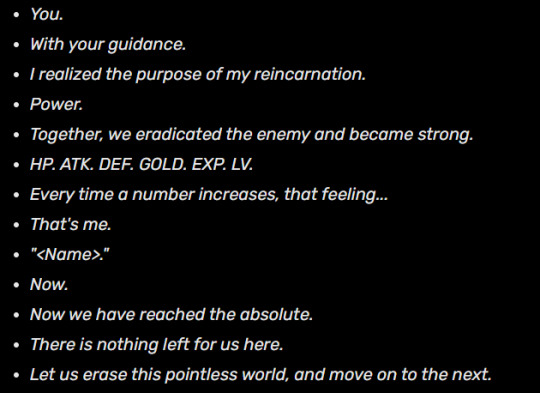
Undertale is more about the Player having power, and not just in the Unkillable Time God sense, in the sense of the power to reframe and change the narrative. Both the Undertale Pacifist and Murder Route has an element of going ‘off script’ of what the game story ‘expects’. Like, the Normal Ending is the only one where the the Player just does what was expected of them and engage with the game world in the same way all the other characters do - that’s just why it only exist to try and convince you to go on one of the other routes.
The Pacifist Route is about the Player using their Aforementioned Unkillable Time God Powers to break away from the world’s general resignation to violence as the answer and proving to everyone a peaceful resolution is possible. The Murder Route is about the Player engaging with the world like… an ordinary RPG basically (as long as you’re heavy on the grinding) and in the process twist the entire narrative into something much darker. The narrative isn’t tricking you into it, if anything, the narrative is subtly nudging you to the Pacifist Ending.
If Undertale comes off as a more effective ‘condemnation’ of the Player than OFF, that’s probably because compared to OFF Undertale is more about what the Player does and the Player’s actions. I still don’t think it’s a very productive to paint it as, like, trying to Shame you. It just makes things far too unnecessarily personal in a really weird way, and it also kinda isolates discussion of the game’s mortality to only how justified it is within the game’s own context - without any acknowledgement of what the game’s trying to say in a larger context when it makes the characters so darn lovable and makes it so heartbreaking when they die.
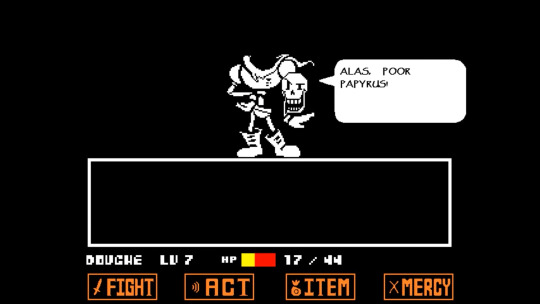
Both in context of how we can try and take the game’s ideals into the real world....

And how it relates to other video games. And I mean, Undertale isn’t just about whatever violence in video game narratives is really necessary - that’s absolutely part of it but also, it’s about how Players engage with video game narratives. And whatever looking at them as just challenges to be one by getting the Big Number....

or challenges you need to 100% complete and drain every single secret from

can take away from what makes a good story actually work.

There’s a reason why the in-universe ‘morally correct’ to play Undertale is to experience the True Pacifist ending once and never open it again. (I dunno if I’ll say the Message of Undertale is ‘looking up all kinds of different minor options and content mining always ruins the magic of stories’ and if it is it’ll be a very funny case of a game’s fandom disproving its own thesis, but it’s certainly something the game wants you consider.)
Despite the obvious influence OFF had on Undertale and especially on it’s Murder Route, I actually think it might be more useful to compare it to Deltarune, at least once we see more of it and where it’s going. With both of these games exploring a very complicated power dynamic between player and player character and the player being robbed of moral choice and possibly forced to do bad things to advance the narrative - it might be actually a more interesting comparison.
#Off#undertale#undertale meta#undertale analysis#off game#you see on one hand I can't say I enjoy the story of Undertale LESS just because the fandom complied this big ol' lists of Every Single#Event Trigger in the whole entire game or something#but on the other hand there is something very impactful about going through the Pacifist Route#and KNOWING you won't be able to justify to yourself doing a True Reset#so you just try your best to do everything that you can and really experience the game to it's fullest before you have to say Goodbye to#all of these characters basically forever#and espacially after just helped Asriel agree to let US go and move on#the fact the game also pleads for us to go and move on does enchance the emotional power of the ending on some level I think
232 notes
·
View notes
Text
I think Shadow is just in the World of Thematic Resolution and is fighting for his life to not admit that Sonic is actually a pretty cool guy he likes being around
It is called Sonic x Shadow
#sonic the hedgehog#sonic x shadow generations#sonic generations#snapcube#snapcube rtfd#shadow the hedgehog
26 notes
·
View notes
Text
I have this personal issue with YA is that most of the time I feel like the genre is working at odds with itself. When I was around that age I felt like the idea of my exploration into adult storytelling (which began like most children around age 12) being compromised by something ostensibly aimed at me was patronising. It was telling me that 'this' was what I ought to be reading, which didn't feel right. More specifically I think the majority of the time it fails to tell the story of teenage transition into adult responsibility mostly because I think adult stories already do this well, and I think it's a disservice to young readers to imply otherwise. And even more specifically I don't think it has the established pedagogy behind it that children's storytelling does, by necessity, because the educational purpose of children's storytelling is essentially a civic responsibility.
I also think that the phenomenon of adult readers largely bolstering the YA genre is very telling about what it is good at, e.g. light entertainment, low emotional stakes, simple and straightforward tie between emotional development of the romance to the plot (often romance novels don't have genre plottiness).
I was thinking on this reading an interview with Suzanne Collins after I had recently reread The Hunger Games, where she discussed her intentions to write a war story for children/teenagers within the YA genre. And something that occurred to me reading both THG as well as the recent prequel backstory for the bad guy is that at every turn, her thematic intentions are compromised by recognisable YA tropes which just make it feel sticky and plastic. I cannot take it seriously as a book that adults can read. This is distinct from children's storytelling, because there is a discord between the adult themes and the childish portrayal.
You can tell me until you're blue in the face that the love triangle is a symbolic war for Katniss between war and peace, but that does not justify the material vehicle for this idea: a love triangle, with tropey entitlement, with clumsy execution, with delayed execution when the author is trying to tell you she's writing a serious story where Prim doesn't survive, and then Katniss/Peeta is kind of realised offhandedly afterwards. There is an inherent silliness to trying to marry this idea of a love triangle to a serious moral conflict. The serious moral conflict which girls face at that age is not something farcically realised through which boy they like. They have serious moral concerns about the world and it is actually facile to imply otherwise, and it is in no way redeemed through its metaphor. Worse, the definitive resolution of the love triangle lands with a dull thud, and I am still teased endlessly, with boring and hackneyed and gimmicky scenes between Katniss and Gale, that perhaps she might actually just choose this one (wink) - not at all reflective of the allure of violence, the call for vengeance - the painful consequences of violence, the spiritual wear of it - right through to the third book. She does not definitively reject Gale, with emphatic insistence - with fear or hatred or something thematically meaningful - and is essentially forced into that position via Prim's death. Yes, it's symbolic - yet symbolism is not self-justifying. Symbolism heightens and suggests material, not is materiality unto itself.
This is not least to get into my problems with the prequel story (A Ballad of Songbirds and Snakes), where the spiritual corruption of its protagonist is something straight out of Dostoyevsky yet is written like the twee YA story it is. It is constantly at war with itself because it is trying to write something 'for young people' with higher themes. What I think is truly condescending is the implication that for war stories to be accessible to teenagers, it must be simplified in a medium 'meant for kids'. Sure - the series is grossly popular and has had a massive reception, for the good in some ways, that makes people think about the spectacle of war (even if i do think this theme of spectacle is actually compromised by its own genre). But I do think that the aspirational intent of the THG series really is probably the perfect example of my bone to pick with the YA genre. It compromises itself. Had it not been YA, or had it not stuck to YA conventions, I think it would have been more artistically defensible. And I don't even think this is a matter of the simplicity of the prose, or even the presence of romance, or a young girl's perspective of war - none of those three, pointed to as traditional elements of YA, are the problem here. The identifiable structure of the three books (repeating three times) is probably not even the problem either. But it wants me to believe it has serious things to say, using silly vehicles for it.
I still think the fundamental existence of the YA genre is questionable. For whom is it truly aimed at? What does it mean to teach children to love reading? I think that we may potentially see here a product of that 'kidult' genre - the tension between the childlike medium and the desire for adult sensibility - mostly something I have discussed within fandom and children's shows which attract adult audiences (SU, Voltron, and so on). The ready defensiveness criticism of the genre incurs suggests that they want the ease of being an established publishing genre read by millions worldwide but they want the escape from criticism that other genres do not enjoy. More importantly at the heart of this is what it means to write fiction for children and teenagers in the transition to adulthood, and I think that the class of YA defenders online are actually morally and pedagogically irresponsible. Either you are or aren't a criticisable genre, and either you are or aren't 'YA' - Young Adult, traditionally aimed at teenagers - and either you are or aren't making money.
I used THG as a case study, and jumping off for this thought, because it is a sensation cross-readership - and continues to attract new readers, and readers return to it for nostalgia. The Katniss/Peeta dynamic remains a relative strength to the series, although I'd argue it is fatally compromised by the love triangle, and I think it has some interesting ideas about the theatre of war - particularly through a feminine lense. But equally the reality of war is entirely absent from it, reduced to spectacle to manifest its thematic statement about propaganda but also for the focus of violence to be on the arena (and its Minotaur allusion), and the relatively isolated perspective of the protagonist within a YA novel. Such is the source of my criticism. But to take it even further, I think that, because YA does not bear enough responsibility to its teenage readers, it is generally patronising with its depiction of these adult themes of the world they are entering. Then you enter the discourse which is 'are adult books appropriate for developing readers to read?' and in which case I would've thrown my Stephen King at you for daring to ask such a question.
These are just my feelings. I fear that a Tumblrina does not hold much sway over potentially the most profitable and booming book genre now around. They may develop further also - I think THG is the most redeemable of any YA, but for that very reason illuminates these problems the best.
5 notes
·
View notes
Text
you know what this twitter fiasco is putting me in mind of, it's the weird narrative betrayal at the climax of last year's silly romcom Free Guy.
not the stupid annoying one where human/AI romance is too weird after all, so the titular protagonist turns out to be just a proxy for the man who programmed him, the other more jarring one,
where during the dramatic buildup we cut from Guy's security-guard-at-the-MMORPG-bank friend Buddy heroically buying time before his own deletion, to the tech company's actual human security guards watching the livestream and passionately identifying with him going, "that security guard is a goddamned hero."
shortly before Taika Waititi's character, an awful bro-CEO with fabulously awful fashion sense and no actual abilities, starts hitting the servers with a fire axe to cover up his illegal code plagiarism that's about to be livestreamed to millions.
because the entire setup there called for him to be stopped by his own security. there was a clear line of dominoes set up for them to be doing this. it would have been logically and thematically consistent, and really satisfying.
and correct! that's the thing about owning a corporation: its property is not your personal property. this legal construct protects you in a lot of ways, which is why it's worth incorporating even a one-man business, but it also means you cannot, legally, just smash the company's shit. especially once there's public stock, which in this case there was. it's not yours in your capacity as an individual.
like realistically these guys can do whatever they want, especially as sole-owner, but between the fact that the AIs in those servers had just turned out to be people, the fact that he was going crazy with a fire axe, the fact that his reasoning was 'hiding the evidence,' and the fact that he was not actually entitled to break those things, the security guys should have pinned the CEO down and taken his axe.
but for some reason, instead the female lead just offers to give him everything she's dedicated years of her life to proving he stole if he'll just leave that last server unbroken.
and that's the resolution. and all the digital people are restored somehow by computer magic and it's all fine? good end??? i was so mad!
and also kind of appalled by the implication that showing a corporate edgelord's manbaby smashing meltdown being something the peons could rise up and interfere with would be too radical somehow???
#hoc est meum#i throw salt#film reviews i guess lol#i saw this at the drive-in theater i don't remember what i was there to see but it wasn't that#i liked it though right up until ending weird#taika as the muskrat
35 notes
·
View notes
Note
i often see your posts next to the screenshots of Geocities homepages captured by @oneterabyteofkilobyteage, and that made wonder: if you were on Geocities, somewhere back in the 1990s, instead of 2020s Tumblr, what would your personal site look like? What would you talk about? Would it be loaded with gifs, personal poems, low-resolution scans of photos of you? Would you join a thematic webring? MIDI files? ASCII art?
The answer to this question is kind of funny because I had actually made a fake Geocities page for a project back in college, but I never actually hosted it anywhere!
(The project was based on something I'd read about Alexanderwohl, a community in Kansas populated by Russian immigrants. Among other things, it featured a "Russian tourist attraction" called "Valentine Village," which was a little frontage town on the main highway, done up in a cheesy attempt to recreate Russian culture. There was a huge sign which said "Универсальный магазин" and went on like that, but no one could read Cyrillic, so no one knew what it meant. The frontage town was very small and was all you could really see when you drove by, so a lot of people saw it as a joke, as silly cheesiness, or just as bizarre.)
So I had this idea for an experimental webcomic in which a guy is driving through Kansas and in the middle of nowhere he sees this frontage town out of nowhere and then he just sees it. He knows he's been there before, but doesn't know how or why, and then . . . it's all gone. And he has a panic attack and turns on the radio and hears about the whole Valentine Village thing and the mysterious Russian tourist attraction, and he starts having a nervous breakdown.
Well, it had a prose version (which was eventually published in a lit mag) but I also drew a fake Geocities page for it. My idea was to have it be a realistic "mirror image" of the prose excerpt, i.e. write the page as though I were really the guy, except I know he's fictional, and make it pretty true to life as a Geocities page from 2002 might have been. It'd be kind of "eerie" in a very conventional way, I guess.
It's a shame I never actually put it up. I think I still have the image files somewhere . . . I should track them down and post them.
18 notes
·
View notes
Note
Would you consider AM to be a thematic reconstruction of the Blue Lord formula in FE?
Eh...kind of? Reconstruction implies that IS has ever deliberately deconstructed the archetype. They've certainly played around with it, in games like Genealogy and Radiant Dawn and even with lords like Hector and Ephraim who go through a refusal of the call stage of development, but as all of those instances still reach essentially the same endpoint I don't know if I'd call them deconstruction.
I've always thought of Dimitri more as a Blue Lord with (some) psychological realism. Marth loses his kingdom in the opening text crawl but doesn't react to that much, at least in FE1. Leif also loses his kingdom and begins the story angry and immature before his development, but he never loses his revenge motivation. Dimitri's breakdown feels more relatable from the outset because it's driven by betrayal and losses more personal than that of losing a country to an invading army. AM builds on that by treating his mental state seriously at most points that don't involve the self-insert: his followers feel directionless, he still struggles even after his big dramatic turn, and he attempts to turn his desire for revenge into something more positive even if it doesn't work out that way in the end. You could perhaps call that a reconstruction, that if you were to put an actual person in the typical position of a Blue Lord they would likely become dangerous and self-destructive from all the trauma and destabilization which would in turn make them bad rulers...but that it doesn't have to end that way.
Reading this ask though, I did have the thought that this could be looked at another way. Something that sometimes gets lost when people are discussing fantasy fiction is that the concept of monarchy may as well be purely a writing tool at this point. Most audiences consider monarchy as a system of government to be quaint and outdated and not something to be taken seriously, so it can be easily used in fiction without any sense of real-world applicability. It's a bit like Freudian psychoanalysis or astrology in that regard. This is relevant to FE lords because monarchy happens to be a perfect vehicle for Chosen One narratives: you don't need to invent a supernatural explanation for why a character is Chosen if they're simply born to inherit a throne. Dimitri, like many lords before him, is very much that character.
The problem though is that, for video games, you cannot get more Chosen One-y than the player character. This undoubtedly applies to Byleth - recall just how convoluted their backstory is to set them up as the perfect vessel for the player Sothis - but then leads to the problem of AM effectively having two such figures. It's rather awkward to have a story with two allied Chosen Ones, especially when one of them (presumably) spent money on the game and expects a certain level of pandering...and the other is a pile of code with attached assets. This leaves players with two options:
ship them together, hence the popularity of Dimileth, or
ignore or downplay the one they don't like.
Option #2 is quite easy here; there are three other routes if you don't like Dimitri, and if you don't like Byleth AM just so happens to be the story that needs them least to work, with a role that could easily be filled by Dimitri's established support network (as we actually see in AG). However, that fundamental tension remains, and I think it's at least a small part of why AM gets some of the criticisms it does. AM is too centered on Dimitri, there should have been the option to leave him because he's annoying, he's too gay for straight guys who play as and project onto m!Byleth, or even my observation that an AM without Byleth would be significantly better off for the exclusion. The route sort of poses the question of what a traditional FE Blue Lord standing alongside an Avatar would look like, and if there's a resolution to that tension between the protagonist archetype of the series and the need for self-inserts around whom the world must revolve. Player response on that point has been highly varied.
As seen with Corrin and Alear, IS's best solution is to combine those roles. Nonetheless, I still appreciate that Three Houses gives us options. You can opt into the familiar Blue Lord story if you like, and the Avatar isn't necessarily required for it to make sense.
8 notes
·
View notes
Note
Welp
6 is dead and mhav is probably ending soon, but at least we got one final moment of thematic parallels that imply a romantic relationship between koichi and 6!
6 and Koichi ARE the most shipable hero/villain we have in MHA, however I feel this is the time to publicly say that I don’t actually ship them that much 😭. I love them as a pair because of the way you can play with their relationship, I just can’t read it as romantic at all.
I have many other thoughts on the chapter but I loved how the handled the ending and not just because I called it several months ago this is one of the best ways it could have ended and it was set up MASTERFULLY.
From the use of 6’s scar as a symbol, to the set up of “-and you’ll look to the sunset and think of the girl you couldn’t save.” with “This face is based off of yours Koichi!” finally turning into “Every time you’ll look into the mirror, you’ll see me, the guy you couldn’t save”
Wonderful storytelling and every major character gets a resolution, including Aizawa (even though it bites that he goes to help people and then Koichi, his first unofficial student, immediately gets hurt).
Now I just need everyone to got to the hospital and for Koichi and Pop to exchange marriage vows the second they see each other, that’s all.
#mha vigilantes#mhav#bnha vigilantes#everyone go read vigilantes challenge#koichi haimawari#mha vigilantes spoilers#bnha vigilantes spoilers#welovecloud#welovecloud answers
22 notes
·
View notes
Text
So Under Freezing Stars is finally done 😭I’m incredibly sad it's over but also so happy with the finished product and with the response it's gotten over the past few months <3
I thought it might be fun to compile some little details about the fic- easter eggs and callbacks to the original books, little thematic details and symbols I included, chapter parallels, stuff like that! Everything is below the cut to avoid spoilers, but hopefully y’all find it fun and it’s an interesting way to top everything off :’)
Symbolism/Theme
the first time Annabeth drinks nectar, she can’t put a taste to it. This is because she’s in a transitional period with her identity, where she hasn’t quite solidified a sense of home. When she wakes up after being given nectar for the second time, her mouth tastes like apples because her and Perseus had split one together back on the ship. It’s the first food they shared together after she starts associating him with the concept of home, so the nectar takes on that taste. also apples are a sacred fruit of aphrodite so, ya know ;)
Water plays a big role thematically. There’s the obvious connection to Perseus (whenever Annabeth is looking out into the sea during an unrelated conversation, it’s sort of supposed to indicate that he’s on her mind) but also the more traditional symbolic meanings of water— washing someone/something clean, renewal, rebirth, etc. all of which are themes of the book anyways so it worked out!! Chapters to watch for water symbolism would be 18 and 32 in particular but really anytime there’s an emphasis on the sea
the quote I chose for the epigraph (”Understand this if you understand nothing: it is a powerful thing to be seen”) is from Freshwater by Akwaeke Emezi, one of my favorite books! In the context of Freshwater, this quote is when the main character (spoiler) meets someone from their culture who helps them realize they’re a god. It just felt like a particularly perfect way to start off the story, given how many parallels there are to that moment in Freshwater to the entirety UFS. Even without context it frames the story of one of self discovery, but particularly self discovery in tandem with another, which is exactly what I think UFS is about at its core. Freshwater is an incredible book that I owe so much to in terms of inspiring UFS thematically and I def recommend it, though please look up TWs for it beforehand bc it does contain a lot of triggering content.
another more obvious meta thing, the chapter titles switch from Latin to Greek after Annabeth realizes she’s Greek and not Roman
Chapter Parallels
ch20 is called divinity because Annabeth views the sex as akin to a religious awakening— sleeping with her lover is both an act of worship and a revelatory experience wherein she comes to terms with the godly side of her identity. But chapter 33 is called mortal because the thing that makes them special together isn’t necessarily their parentage or their godliness, it’s their humanity. Gods can’t bare their souls to one another because they don’t have one. But mortals— vulnerable and breakable as they are— have that advantage, and when they sleep together the second time Annabeth is fully cognizant and appreciative of that fact.
The drooling in sleep thing is obviously a callback to the OG books (it’s such an iconic first line I had to include it somehow lol) but it also has a thematic parallel (one that Annabeth actually points out within the narrative). That was one of the first moments she recognized he was human and not some unattainable figure, so it comes back to her later in ch33 when she's thinking about their mortality
In ch14, Piper offers to fix Annabeth’s hair as a peace offering. In ch33, Perseus untangles her hair for her because the idea of doing it herself is overwhelming for her. I just really like the idea of caring for someone else’s hair being an act of love towards that person :’)
Easter Eggs/OG Book Callbacks
Blackjack asking for fried dough at the end of chapter 4 is a reference to him always asking for donuts in the original books (yes I did google “did they have donuts in ancient rome” for that lol)
The way they fight the hellhound in ch6 (Percy distracting in the front and Annabeth sneaking around the back) is their go-to fighting strategy in the books, which Percy comments on in BOTL
Obviously Jason passing out every 30 seconds is a reference to Jason getting knocked out like 3x a book in HOO (#brason)
Fai turning into a lizard in the Athens chapter is a callback to Frank the Iguana from MOA
the masthead of the ship being a dragon is meant to be reminiscent of Festus
Other stuff!
Chapter 16 is named calm and chapter 17 is named storm bc 16 is the calm before the (literal) storm
Annabeth saying “is your head full of kelp” to percy in ch13 is the closest I could feasibly get to her calling him seaweed brain lol. I think in chapter 15 she also comments to herself that she feels like his brain is made of seaweed sometimes <3
When Annabeth decides to let Jason and Piper wake up on their own instead of waking them up herself in ch32, it’s sort of a callback to previous comments she’s made about Jason not being a morning person. She’s still scared that he’ll be mad at her, and she doesn’t want to exacerbate that by waking him up early because she knows he’s in a worse mood in the morning.
In the final conversation with Jason, Annabeth says “you’re always too hard on yourself” which is kind of a play on her last words to Luke in the original books (“you always pushed yourself too hard”). I don’t know why but I’ve always really liked that line, it feels very Annabeth, so I wanted to include it somehow. Jason isn’t dying but she does love him like a brother so that felt like a good place for it to go.
something to generally look out for is how reliable or not reliable Annabeth’s narration is. She’s not like a Holden Caufield where she straight up lies to the audience, but her thoughts and observations are not always the most true version of what’s going on. This is probably most obvious in the Luke conflict (particularly chapters 21 and 23) but also when she has to read other people’s emotions and make assumptions about what they’re thinking based on that. A lot of times she’s straight up wrong and just doesn’t realize it (this is particularly relevant in ch14 lol)
another general thing to look at is chapter titles, particularly in the second half of the book. A lot of times the title of the chapter is one of the main themes of the story and that chapter is either an important plot point for that theme or a resolution of it!
That’s all I can think of right now! I might update this later if I remember more but this is already stupidly long lol. I would apologize for turning my fic into an English assignment but if you made it this far you probably thought it was at least a little interesting, so 😂
thank you guys again for reading <3 love you all!
#UFS#percabeth#don't read this until you read the ending!#i just had to post it now so I could link it lol#last chapter is coming in 2 minutes!
55 notes
·
View notes
Text
Thoughts on: Criterion's Neo-Noir Collection
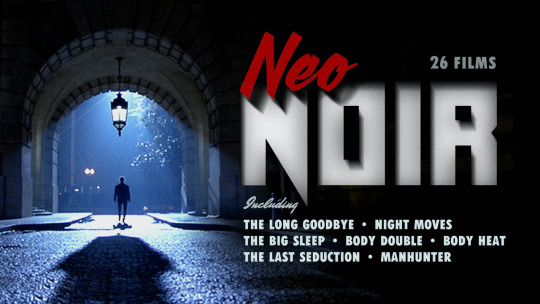
I have written up all 26 films* in the Criterion Channel's Neo-Noir Collection.
Legend:
rw - rewatch; a movie I had seen before going through the collection
dnrw - did not rewatch; if a movie met two criteria (a. I had seen it within the last 18 months, b. I actively dislike it) I wrote it up from memory.
* in September, Brick leaves the Criterion Channel and is replaced in the collection with Michael Mann's Thief. May add it to the list when that happens.
Note: These are very "what was on my mind after watching." No effort has been made to avoid spoilers, nor to make the plot clear for anyone who hasn't seen the movies in question. Decide for yourself if that's interesting to you.
Cotton Comes to Harlem
I feel utterly unequipped to asses this movie. This and Sweet Sweetback's Baadasssss Song the following year are regularly cited as the progenitors of the blaxploitation genre. (This is arguably unfair, since both were made by Black men and dealt much more substantively with race than the white-directed films that followed them.) Its heroes are a couple of Black cops who are treated with suspicion both by their white colleagues and by the Black community they're meant to police. I'm not 100% clear on whether they're the good guys? I mean, I think they are. But the community's suspicion of them seems, I dunno... well-founded? They are working for The Man. And there's interesting discussion to the had there - is the the problem that the law is carried out by racists, or is the law itself racist? Can Black cops make anything better? But it feels like the film stacks the deck in Gravedigger and Coffin Ed's favor; the local Black church is run by a conman, the Back-to-Africa movement is, itself, a con, and the local Black Power movement is treated as an obstacle. Black cops really are the only force for justice here. Movie portrays Harlem itself as a warm, thriving, cultured community, but the people that make up that community are disloyal and easily fooled. Felt, to me, like the message was "just because they're cops doesn't mean they don't have Black soul," which, nowadays, we would call copaganda. But, then, do I know what I'm talking about? Do I know how much this played into or off of or against stereotypes from 1970? Was this a radical departure I don't have the context to appreciate? Is there substance I'm too white and too many decades removed to pick up on? Am I wildly overthinking this? I dunno. Seems like everyone involved was having a lot of fun, at least. That bit is contagious.
Across 110th Street
And here's the other side of the "race film" equation. Another movie set in Harlem with a Black cop pulled between the police, the criminals, and the public, but this time the film is made by white people. I like it both more and less. Pro: this time the difficult position of Black cop who's treated with suspicion by both white cops and Black Harlemites is interrogated. Con: the Black cop has basically no personality other than "honest cop." Pro: the racism of the police force is explicit and systemic, as opposed to comically ineffectual. Con: the movie is shaped around a racist white cop who beats the shit out of Black people but slowly forms a bond with his Black partner. Pro: the Black criminal at the heart of the movie talks openly about how the white world has stacked the deck against him, and he's soulful and relateable. Con: so of course he dies in the end, because the only way privileged people know to sympathetize with minorities is to make them tragic (see also: The Boys in the Band, Philadelphia, and Brokeback Mountain for gay men). Additional con: this time Harlem is portrayed as a hellhole. Barely any of the community is even seen. At least the shot at the end, where the criminal realizes he's going to die and throws the bag of money off a roof and into a playground so the Black kids can pick it up before the cops reclaim it was powerful. But overall... yech. Cotton Comes to Harlem felt like it wasn't for me; this feels like it was 100% for me and I respect it less for that.
The Long Goodbye (rw)
The shaggiest dog. Like much Altman, more compelling than good, but very compelling. Raymond Chandler's story is now set in the 1970's, but Philip Marlowe is the same Philip Marlowe of the 1930's. I get the sense there was always something inherently sad about Marlowe. Classic noir always portrayed its detectives as strong-willed men living on the border between the straightlaced world and its seedy underbelly, crossing back and forth freely but belonging to neither. But Chandler stresses the loneliness of it - or, at least, the people who've adapted Chandler do. Marlowe is a decent man in an indecent world, sorting things out, refusing to profit from misery, but unable to set anything truly right. Being a man out of step is here literalized by putting him forty years from the era where he belongs. His hardboiled internal monologue is now the incessant mutterings of the weird guy across the street who never stops smoking. Like I said: compelling! Kael's observation was spot on: everyone in the movie knows more about the mystery than he does, but he's the only one who cares. The mystery is pretty threadbare - Marlowe doesn't detect so much as end up in places and have people explain things to him. But I've seen it two or three times now, and it does linger.
Chinatown (rw)
I confess I've always been impressed by Chinatown more than I've liked it. Its story structure is impeccable, its atmosphere is gorgeous, its noirish fatalism is raw and real, its deconstruction of the noir hero is well-observed, and it's full of clever detective tricks (the pocket watches, the tail light, the ruler). I've just never connected with it. Maybe it's a little too perfectly crafted. (I feel similar about Miller's Crossing.) And I've always been ambivalent about the ending. In Towne's original ending, Evelyn shoots Noah Cross dead and get arrested, and neither she nor Jake can tell the truth of why she did it, so she goes to jail for murder and her daughter is in the wind. Polansky proposed the ending that exists now, where Evelyn just dies, Cross wins, and Jake walks away devastated. It communicates the same thing: Jake's attempt to get smart and play all the sides off each other instead of just helping Evelyn escape blows up in his face at the expense of the woman he cares about and any sense of real justice. And it does this more dramatically and efficiently than Towne's original ending. But it also treats Evelyn as narratively disposable, and hands the daughter over to the man who raped Evelyn and murdered her husband. It makes the women suffer more to punch up the ending. But can I honestly say that Towne's ending is the better one? It is thematically equal, dramatically inferior, but would distract me less. Not sure what the calculus comes out to there. Maybe there should be a third option. Anyway! A perfect little contraption. Belongs under a glass dome.
Night Moves (rw)
Ah yeah, the good shit. This is my quintessential 70's noir. This is three movies in a row about detectives. Thing is, the classic era wasn't as chockablock with hardboiled detectives as we think; most of those movies starred criminals, cops, and boring dudes seduced to the darkness by a pair of legs. Gumshoes just left the strongest impressions. (The genre is said to begin with Maltese Falcon and end with Touch of Evil, after all.) So when the post-Code 70's decided to pick the genre back up while picking it apart, it makes sense that they went for the 'tecs first. The Long Goodbye dragged the 30's detective into the 70's, and Chinatown went back to the 30's with a 70's sensibility. But Night Moves was about detecting in the Watergate era, and how that changed the archetype. Harry Moseby is the detective so obsessed with finding the truth that he might just ruin his life looking for it, like the straight story will somehow fix everything that's broken, like it'll bring back a murdered teenager and repair his marriage and give him a reason to forgive the woman who fucked him just to distract him from some smuggling. When he's got time to kill, he takes out a little, magnetic chess set and recreates a famous old game, where three knight moves (get it?) would have led to a beautiful checkmate had the player just seen it. He keeps going, self-destructing, because he can't stand the idea that the perfect move is there if he can just find it. And, no matter how much we see it destroy him, we, the audience, want him to keep going; we expect a satisfying resolution to the mystery. That's what we need from a detective picture; one character flat-out compares Harry to Sam Spade. But what if the truth is just... Watergate? Just some prick ruining things for selfish reasons? Nothing grand, nothing satisfying. Nothing could be more noir, or more neo-, than that.
Farewell, My Lovely
Sometimes the only thing that makes a noir neo- is that it's in color and all the blood, tits, and racism from the books they're based on get put back in. This second stab at Chandler is competant but not much more than that. Mitchum works as Philip Marlowe, but Chandler's dialogue feels off here, like lines that worked on the page don't work aloud, even though they did when Bogie said them. I'll chalk it up to workmanlike but uninspired direction. (Dang this looks bland so soon after Chinatown.) Moose Malloy is a great character, and perfectly cast. (Wasn't sure at first, but it's true.) Some other interesting cats show up and vanish - the tough brothel madam based on Brenda Allen comes to mind, though she's treated with oddly more disdain than most of the other hoods and is dispatched quicker. In general, the more overt racism and misogyny doesn't seem to do anything except make the movie "edgier" than earlier attempts at the same material, and it reads kinda try-hard. But it mostly holds together. *shrug*
The Killing of a Chinese Bookie (dnrw)
Didn't care for this at all. Can't tell if the script was treated as a jumping-off point or if the dialogue is 100% improvised, but it just drags on forever and is never that interesting. Keeps treating us to scenes from the strip club like they're the opera scenes in Amadeus, and, whatever, I don't expect burlesque to be Mozart, but Cosmo keeps saying they're an artful, classy joint, and I keep waiting for the show to be more than cheap, lazy camp. How do you make gratuitious nudity boring? Mind you, none of this is bad as a rule - I love digressions and can enjoy good sleaze, and it's clear the filmmakers care about what they're making. They just did not sell it in a way I wanted to buy. Can't remember what edit I watched; I hope it was the 135 minute one, because I cannot imagine there being a longer edit out there.
The American Friend (dnrw)
It's weird that this is Patricia Highsmith, right? That Dennis Hopper is playing Tom Ripley? In a cowboy hat? I gather that Minghella's version wasn't true to the source, but I do love that movie, and this is a long, long way from that. This Mr. Ripley isn't even particularly talented! Anyway, this has one really great sequence, where a regular guy has been coerced by crooks into murdering someone on a train platform, and, when the moment comes to shoot, he doesn't. And what follows is a prolonged sequence of an amateur trying to surreptitiously tail a guy across a train station and onto another train, and all the while you're not sure... is he going to do it? is he going to chicken out? is he going to do it so badly he gets caught? It's hard not to put yourself in the protagonist's shoes, wondering how you would handle the situation, whether you could do it, whether you could act on impulse before your conscience could catch up with you. It drags on a long while and this time it's a good thing. Didn't much like the rest of the movie, it's shapeless and often kind of corny, and the central plot hook is contrived. (It's also very weird that this is the only Wim Wenders I've seen.) But, hey, I got one excellent sequence, not gonna complain.
The Big Sleep
Unlike the 1946 film, I can follow the plot of this Big Sleep. But, also unlike the 1946 version, this one isn't any damn fun. Mitchum is back as Marlowe (this is three Marlowes in five years, btw), and this time it's set in the 70's and in England, for some reason. I don't find this offensive, but neither do I see what it accomplishes? Most of the cast is still American. (Hi Jimmy!) Still holds together, but even less well than Farewell, My Lovely. But I do find it interesting that the neo-noir era keeps returning to Chandler while it's pretty much left Hammet behind (inasmuch as someone whose genes are spread wide through the whole genre can be left behind). Spade and the Continental Op, straightshooting tough guys who come out on top in the end, seem antiquated in the (post-)modern era. But Marlowe's goodness being out of sync with the world around him only seems more poignant the further you take him from his own time. Nowadays you can really only do Hammett as pastiche, but I sense that you could still play Chandler straight.
Eyes of Laura Mars
The most De Palma movie I've seen not made by De Palma, complete with POV shots, paranormal hoodoo, and fixation with sex, death, and whether images of such are art or exploitation (or both). Laura Mars takes photographs of naked women in violent tableux, and has gotten quite famous doing so, but is it damaging to women? The movie has more than a superficial engagement with this topic, but only slightly more than superficial. Kept imagining a movie that is about 30% less serial killer story and 30% more art conversations. (But, then, I have an art degree and have never murdered anyone, so.) Like, museums are full of Biblical paintings full of nude women and slaughter, sometimes both at once, and they're called masterpieces. Most all of them were painted by men on commission from other men. Now Laura Mars makes similar images in modern trappings, and has models made of flesh and blood rather than paint, and it's scandalous? Why is it only controversial once women are getting paid for it? On the other hand, is this just the master's tools? Is she subverting or challenging the male gaze, or just profiting off of it? Or is a woman profiting off of it, itself, a subversion? Is it subversive enough to account for how it commodifies female bodies? These questions are pretty clearly relevant to the movie itself, and the movies in general, especially after the fall of the Hays Code when people were really unrestrained with the blood and boobies. And, heck, the lead is played by the star of Bonnie and Clyde! All this is to say: I wish the movie were as interested in these questions as I am. What's there is a mildly diverting B-picture. There's one great bit where Laura's seeing through the killer's eyes (that's the hook, she gets visions from the murderer's POV; no, this is never explained) and he's RIGHT BEHIND HER, so there's a chase where she charges across an empty room only able to see her own fleeing self from ten feet behind. That was pretty great! And her first kiss with the detective (because you could see a mile away that the detective and the woman he's supposed to protect are gonna fall in love) is immediately followed by the two freaking out about how nonsensical it is for them to fall in love with each other, because she's literally mourning multiple deaths and he's being wildly unprofessional, and then they go back to making out. That bit was great, too. The rest... enh.
The Onion Field
What starts off as a seemingly not-that-noirish cops-vs-crooks procedural turns into an agonizingly protracted look at the legal system, with the ultimate argument that the very idea of the law ever resulting in justice is a lie. Hoo! I have to say, I'm impressed. There's a scene where a lawyer - whom I'm not sure is even named, he's like the seventh of thirteen we've met - literally quits the law over how long this court case about two guys shooting a cop has taken. He says the cop who was murdered has been forgotten, his partner has never gotten to move on because the case has lasted eight years, nothing has been accomplished, and they should let the two criminals walk and jail all the judges and lawyers instead. It's awesome! The script is loaded with digressions and unnecessary details, just the way I like it. Can't say I'm impressed with the execution. Nothing is wrong, exactly, but the performances all seem a tad melodramatic or a tad uninspired. Camerawork is, again, purely functional. It's no masterpiece. But that second half worked for me. (And it's Ted Danson's first movie! He did great.)
Body Heat (rw)
Let's say up front that this is a handsomely-made movie. Probably the best looking thing on the list since Night Moves. Nothing I've seen better captures the swelter of an East Coast heatwave, or the lusty feeling of being too hot to bang and going at it regardless. Kathleen Turner sells the hell out of a femme fatale. There are a lot of good lines and good performances (Ted Danson is back and having the time of his life). I want to get all that out of the way, because this is a movie heavily modeled after Double Indemnity, and I wanted to discuss its merits before I get into why inviting that comparison doesn't help the movie out. In a lot of ways, it's the same rules as the Robert Mitchum Marlowe movies - do Double Indemnity but amp up the sex and violence. And, to a degree it works. (At least, the sex does, dunno that Double Indemnity was crying out for explosions.) But the plot is amped as well, and gets downright silly. Yeah, Mrs. Dietrichson seduces Walter Neff so he'll off her husband, but Neff clocks that pretty early and goes along with it anyway. Everything beyond that is two people keeping too big a secret and slowly turning on each other. But here? For the twists to work Matty has to be, from frame one, playing four-dimensional chess on the order of Senator Palpatine, and its about as plausible. (Exactly how did she know, after she rebuffed Ned, he would figure out her local bar and go looking for her at the exact hour she was there?) It's already kind of weird to be using the spider woman trope in 1981, but to make her MORE sexually conniving and mercenary than she was in the 40's is... not great. As lurid trash, it's pretty fun for a while, but some noir stuff can't just be updated, it needs to be subverted or it doesn't justify its existence.
Blow Out
Brian De Palma has two categories of movie: he's got his mainstream, director-for-hire fare, where his voice is either reigned in or indulged in isolated sequences that don't always jive with the rest fo the film, and then there's his Brian De Palma movies. My mistake, it seems, is having seen several for-hires from throughout his career - The Untouchables (fine enough), Carlito's Way (ditto, but less), Mission: Impossible (enh) - but had only seen De Palma-ass movies from his late period (Femme Fatale and The Black Dahlia, both of which I think are garbage). All this to say: Blow Out was my first classic-era De Palma, and holy fucking shit dudes. This was (with caveats) my absolute and entire jam. I said I could enjoy good sleaze, and this is good friggin' sleaze. (Though far short of De Palma at his sleaziest, mercifully.) The splitscreens, the diopter shots, the canted angles, how does he make so many shlocky things work?! John Travolta's sound tech goes out to get fresh wind fx for the movie he's working on, and we get this wonderful sequence of visuals following sounds as he turns his attention and his microphone to various noises - a couple on a walk, a frog, an owl, a buzzing street lamp. Later, as he listens back to the footage, the same sequence plays again, but this time from his POV; we're seeing his memory as guided by the same sequence of sounds, now recreated with different shots, as he moves his pencil in the air mimicking the microphone. When he mixes and edits sounds, we hear the literal soundtrack of the movie we are watching get mixed and edited by the person on screen. And as he tries to unravel a murder mystery, he uses what's at hand: magnetic tape, flatbed editors, an animation camera to turn still photos from the crime scene into a film and sync it with the audio he recorded; it's forensics using only the tools of the editing room. As someone who's spent some time in college editing rooms, this is a hoot and a half. Loses a bit of steam as it goes on and the film nerd stuff gives way to a more traditional thriller, but rallies for a sound-tech-centered final setpiece, which steadily builds to such madcap heights you can feel the air thinning, before oddly cutting its own tension and then trying to build it back up again. It doesn't work as well the second time. But then, that shot right after the climax? Damn. Conflicted on how the movie treats the female lead. I get why feminist film theorists are so divided on De Palma. His stuff is full of things feminists (rightly) criticize, full of women getting naked when they're not getting stabbed, but he also clearly finds women fascinating and has them do empowered and unexpected things, and there are many feminist reads of his movies. Call it a mixed bag. But even when he's doing tropey shit, he explores the tropes in unexpected ways. Definitely the best movie so far that I hadn't already seen.
Cutter's Way (rw)
Alex Cutter is pitched to us as an obnoxious-but-sympathetic son of a bitch, and, you know, two out of three ain't bad. Watched this during my 2020 neo-noir kick and considered skipping it this time because I really didn't enjoy it. Found it a little more compelling this go around, while being reminded of why my feelings were room temp before. Thematically, I'm onboard: it's about a guy, Cutter, getting it in his head that he's found a murderer and needs to bring him to justice, and his friend, Bone, who intermittently helps him because he feels bad that Cutter lost his arm, leg, and eye in Nam and he also feels guilty for being in love with Cutter's wife. The question of whether the guy they're trying to bring down actually did it is intentionally undefined, and arguably unimportant; they've got personal reasons to see this through. Postmodern and noirish, fixated with the inability to ever fully know the truth of anything, but starring people so broken by society that they're desperate for certainty. (Pretty obvious parallels to Vietnam.) Cutter's a drunk and kind of an asshole, but understandably so. Bone's shiftlessness is the other response to a lack of meaning in the world, to the point where making a decision, any decision, feels like character growth, even if it's maybe killing a guy whose guilt is entirely theoretical. So, yeah, I'm down with all of this! A- in outline form. It's just that Cutter is so uninterestingly unpleasant and no one else on screen is compelling enough to make up for it. His drunken windups are tedious and his sanctimonious speeches about what the war was like are, well, true and accurate but also obviously manipulative. It's two hours with two miserable people, and I think Cutter's constant chatter is supposed to be the comic relief but it's a little too accurate to drunken rambling, which isn't funny if you're not also drunk. He's just tedious, irritating, and periodically racist. Pass.
Blood Simple (rw)
I'm pretty cool on the Coens - there are things I've liked, even loved, in every Coen film I've seen, but I always come away dissatisfied. For a while, I kept going to their movies because I was sure eventually I'd love one without qualification. No Country for Old Men came close, the first two acts being master classes in sustained tension. But then the third act is all about denying closure: the protagonist is murdered offscreen, the villain's motives are never explained, and it ends with an existentialist speech about the unfathomable cruelty of the world. And it just doesn't land for me. The archness of the Coen's dialogue, the fussiness of their set design, the kinda-intimate, kinda-awkward, kinda-funny closeness of the camera's singles, it cannot sell me on a devastating meditation about meaninglessness. It's only ever sold me on the Coens' own cleverness. And that archness, that distancing, has typified every one of their movies I've come close to loving. Which is a long-ass preamble to saying, holy heck, I was not prepared for their very first movie to be the one I'd been looking for! I watched it last year and it remains true on rewatch: Blood Simple works like gangbusters. It's kind of Double Indemnity (again) but played as a comedy of errors, minus the comedy: two people romantically involved feeling their trust unravel after a murder. And I think the first thing that works for me is that utter lack of comedy. It's loaded with the Coens' trademark ironies - mostly dramatic in this case - but it's all played straight. Unlike the usual lead/femme fatale relationship, where distrust brews as the movie goes on, the audience knows the two main characters can trust each other. There are no secret duplicitous motives waiting to be revealed. The audience also know why they don't trust each other. (And it's all communicated wordlessly, btw: a character enters a scene and we know, based on the information that character has, how it looks to them and what suspicions it would arouse, even as we know the truth of it). The second thing that works is, weirdly, that the characters aren't very interesting?! Ray and Abby have almost no characterization. Outside of a general likability, they are blank slates. This is a weakness in most films, but, given the agonizingly long, wordless sequences where they dispose of bodies or hide from gunfire, you're left thinking not "what will Ray/Abby do in this scenario," because Ray and Abby are relatively elemental and undefined, but "what would I do in this scenario?" Which creates an exquisite tension but also, weirdly, creates more empathy than I feel for the Coens' usual cast of personalities. It's supposed to work the other way around! Truly enjoyable throughout but absolutely wonderful in the suspenseful-as-hell climax. Good shit right here.
Body Double
The thing about erotic thrillers is everything that matters is in the name. Is it thrilling? Is it erotic? Good; all else is secondary. De Palma set out to make the most lurid, voyeuristic, horny, violent, shocking, steamy movie he could come up with, and its success was not strictly dependent on the lead's acting ability or the verisimilitude of the plot. But what are we, the modern audience, to make of it once 37 years have passed and, by today's standards, the eroticism is quite tame and the twists are no longer shocking? Then we're left with a nonsensical riff on Vertigo, a specularization of women that is very hard to justify, and lead actor made of pulped wood. De Palma's obsessions don't cohere into anything more this time; the bits stolen from Hitchcock aren't repurposed to new ends, it really is just Hitch with more tits and less brains. (I mean, I still haven't seen Vertigo, but I feel 100% confident in that statement.) The diopter shots and rear-projections this time look cheap (literally so, apparently; this had 1/3 the budget of Blow Out). There are some mildly interesting setpieces, but nothing compared to Travolta's auditory reconstructions or car chase where he tries to tail a subway train from street level even if it means driving through a frickin parade like an inverted French Connection, goddamn Blow Out was a good movie! Anyway. Melanie Griffith seems to be having fun, at least. I guess I had a little as well, but it was, at best, diverting, and a real letdown.
The Hit
Surprised by how much I enjoyed this one. Terrance Stamp flips on the mob and spends ten years living a life of ease in Spain, waiting for the day they find and kill him. Movie kicks off when they do find him, and what follows is a ramshackle road movie as John Hurt and a young Tim Roth attempt to drive him to Paris so they can shoot him in front of his old boss. Stamp is magnetic. He's spent a decade reading philosophy and seems utterly prepared for death, so he spends the trip humming, philosophizing, and being friendly with his captors when he's not winding them up. It remains unclear to the end whether the discord he sews between Roth and Hurt is part of some larger plan of escape or just for shits and giggles. There's also a decent amount of plot for a movie that's not terribly plot-driven - just about every part of the kidnapping has tiny hitches the kidnappers aren't prepared for, and each has film-long repercussions, drawing the cops closer and somehow sticking Laura del Sol in their backseat. The ongoing questions are when Stamp will die, whether del Sol will die, and whether Roth will be able to pull the trigger. In the end, it's actually a meditation on ethics and mortality, but in a quiet and often funny way. It's not going to go down as one of my new favs, but it was a nice way to spend a couple hours.
Trouble in Mind (dnrw)
I fucking hated this movie. It's been many months since I watched it, do I remember what I hated most? Was it the bit where a couple of country bumpkins who've come to the city walk into a diner and Mr. Bumpkin clocks that the one Black guy in the back as obviously a criminal despite never having seen him before? Was it the part where Kris Kristofferson won't stop hounding Mrs. Bumpkin no matter how many times she demands to be left alone, and it's played as romantic because obviously he knows what she needs better than she does? Or is it the part where Mr. Bumpkin reluctantly takes a job from the Obvious Criminal (who is, in fact, a criminal, and the only named Black character in the movie if I remember correctly, draw your own conclusions) and, within a week, has become a full-blown hood, which is exemplified by a lot, like, a lot of queer-coding? The answer to all three questions is yes. It's also fucking boring. Even out-of-drag Divine's performance as the villain can't save it.
Manhunter
'sfine? I've still never seen Silence of the Lambs, nor any of the Hopkins Lecter movies, nor, indeed, any full episode of the show. So the unheimlich others get seeing Brian Cox play Hannibal didn't come into play. Cox does a good job with him, but he's barely there. Shame, cuz he's the most interesting part of the movie. Honestly, there's a lot of interesting stuff that's barely there. Will Graham being a guy who gets into the heads of serial killers is explored well enough, and Mann knows how to direct a police procedural such that it's both contemplative and propulsive. But all the other themes it points at? Will's fear that he understands murderers a little too well? Hannibal trying to nudge him towards becoming one? Whatever dance Hannibal and Tooth Fairy are doing? What Tooth Fairy's deal is, anyway? (Why does he wear fake teeth and bite things? Why is he fixated on the red dragon? Does the bit where he says "Francis is gone forever" mean he has DID?) None of it goes anywhere or amounts to anything. I mean, it's certainly more interesting with this stuff than without, but it has that feel of a book that's been pared of its interesting bits to fit the runtime (or, alternately, pulp that's been sloppily elevated). I still haven't made my mind up on Mann's cold, precise camera work, but at least it gives me something to look at. It's fine! This is fine.
Mona Lisa (rw)
Gave this one another shot. Bob Hoskins is wonderful as a hood out of his depth in classy places, quick to anger but just as quick to let anger go (the opening sequence where he's screaming on his ex-wife's doorstep, hurling trash cans at her house, and one minute later thrilled to see his old car, is pretty nice). And Cathy Tyson's working girl is a subtler kind of fascinating, exuding a mixture of coldness and kindness. It's just... this is ultimately a story about how heartbreaking it is when the girl you like is gay, right? It's Weezer's Pink Triangle: The Movie. It's not homophobic, exactly - Simone isn't demonized for being a lesbian - but it's still, like, "man, this straight white guy's pain is so much more interesting than the Black queer sex worker's." And when he's yelling "you woulda done it!" at the end, I can't tell if we're supposed to agree with him. Seems pretty clear that she wouldn'ta done it, at least not without there being some reveal about her character that doesn't happen, but I don't think the ending works if we don't agree with him, so... I'm like 70% sure the movie does Simone dirty there. For the first half, their growing relationship feels genuine and natural, and, honestly, the story being about a real bond that unfortunately means different things to each party could work if it didn't end with a gun and a sock in the jaw. Shape feels jagged as well; what feels like the end of the second act or so turns out to be the climax. And some of the symbolism is... well, ok, Simone gives George money to buy more appropriate clothes for hanging out in high end hotels, and he gets a tan leather jacket and a Hawaiian shirt, and their first proper bonding moment is when she takes him out for actual clothes. For the rest of the movie he is rocking double-breasted suits (not sure I agree with the striped tie, but it was the eighties, whaddya gonna do?). Then, in the second half, she sends him off looking for her old streetwalker friend, and now he looks completely out of place in the strip clubs and bordellos. So far so good. But then they have this run-in where her old pimp pulls a knife and cuts George's arm, so, with his nice shirt torn and it not safe going home (I guess?) he starts wearing the Hawaiian shirt again. So around the time he's starting to realize he doesn't really belong in Simone's world or the lowlife world he came from anymore, he's running around with the classy double-breasted suit jacket over the garish Hawaiian shirt, and, yeah, bit on the nose guys. Anyway, it has good bits, I just feel like a movie that asks me to feel for the guy punching a gay, Black woman in the face needs to work harder to earn it. Bit of wasted talent.
The Bedroom Window
Starts well. Man starts an affair with his boss' wife, their first night together she witnesses an attempted murder from his window, she worries going to the police will reveal the affair to her husband, so the man reports her testimony to the cops claiming he's the one who saw it. Young Isabelle Huppert is the perfect woman for a guy to risk his career on a crush over, and Young Steve Guttenberg is the perfect balance of affability and amorality. And it flows great - picks just the right media to res. So then he's talking to the cops, telling them what she told him, and they ask questions he forgot to ask her - was the perp's jacket a blazer or a windbreaker? - and he has to guess. Then he gets called into the police lineup, and one guy matches her description really well, but is it just because he's wearing his red hair the way she described it? He can't be sure, doesn't finger any of them. He finds out the cops were pretty certain about one of the guys, so he follows the one he thinks it was around, looking for more evidence, and another girl is attacked right outside a bar he knows the redhead was at. Now he's certain! But he shows the boss' wife the guy and she's not certain, and she reminds him they don't even know if the guy he followed is the same guy the police suspected! And as he feeds more evidence to the cops, he has to lie more, because he can't exactly say he was tailing the guy around the city. So, I'm all in now. Maybe it's because I'd so recently rewatched Night Moves and Cutter's Way, but this seems like another story about uncertainty. He's really certain about the guy because it fits narratively, and we, the audience, feel the same. But he's not actually a witness, he doesn't have actual evidence, he's fitting bits and pieces together like a conspiracy theorist. He's fixating on what he wants to be true. Sign me up! But then it turns out he's 100% correct about who the killer is but his lies are found out and now the cops think he's the killer and I realize, oh, no, this movie isn't nearly as smart as I thought it was. Egg on my face! What transpires for the remaining half of the runtime is goofy as hell, and someone with shlockier sensibilities could have made a meal of it, but Hanson, despite being a Corman protege, takes this silliness seriously in the all wrong ways. Next!
Homicide (rw? I think I saw most of this on TV one time)
Homicide centers around the conflicted loyalties of a Jewish cop. It opens with the Jewish cop and his white gentile partner taking over a case with a Black perp from some Black FBI agents. The media is making a big thing about the racial implications of the mostly white cops chasing down a Black man in a Black neighborhood. And inside of 15 minutes the FBI agent is calling the lead a k*ke and the gentile cop is calling the FBI agent a f****t and there's all kinds of invective for Black people. The film is announcing its intentions out the gate: this movie is about race. But the issue here is David Mamet doesn't care about race as anything other than a dramatic device. He's the Ubisoft of filmmakers, having no coherent perspective on social issues but expecting accolades for even bringing them up. Mamet is Jewish (though lead actor Joe Mantegna definitely is not) but what is his position on the Jewish diaspora? The whole deal is Mantegna gets stuck with a petty homicide case instead of the big one they just pinched from the Feds, where a Jewish candy shop owner gets shot in what looks like a stickup. Her family tries to appeal to his Jewishness to get him to take the case seriously, and, after giving them the brush-off for a long time, finally starts following through out of guilt, finding bits and pieces of what may or may not be a conspiracy, with Zionist gun runners and underground neo-Nazis. But, again: all of these are just dramatic devices. Mantegna's Jewishness (those words will never not sound ridiculous together) has always been a liability for him as a cop (we are told, not shown), and taking the case seriously is a reclamation of identity. The Jews he finds community with sold tommyguns to revolutionaries during the founding of Israel. These Jews end up blackmailing him to get a document from the evidence room. So: what is the film's position on placing stock in one's Jewish identity? What is its position on Israel? What is its opinion on Palestine? Because all three come up! And the answer is: Mamet doesn't care. You can read it a lot of different ways. Someone with more context and more patience than me could probably deduce what the de facto message is, the way Chris Franklin deduced the de facto message of Far Cry V despite the game's efforts not to have one, but I'm not going to. Mantegna's attempt to reconnect with his Jewishness gets his partner killed, gets the guy he was supposed to bring in alive shot dead, gets him possibly permanent injuries, gets him on camera blowing up a store that's a front for white nationalists, and all for nothing because the "clues" he found (pretty much exclusively by coincidence) were unconnected nothings. The problem is either his Jewishness, or his lifelong failure to connect with his Jewishness until late in life. Mamet doesn't give a shit. (Like, Mamet canonically doesn't give a shit: he is on record saying social context is meaningless, characters only exist to serve the plot, and there are no deeper meanings in fiction.) Mamet's ping-pong dialogue is fun, as always, and there are some neat ideas and characters, but it's all in service of a big nothing that needed to be a something to work.
Swoon
So much I could talk about, let's keep it to the most interesting bits. Hommes Fatales: a thing about classic noir that it was fascinated by the marginal but had to keep it in the margins. Liberated women, queer-coded killers, Black jazz players, broke thieves; they were the main event, they were what audiences wanted to see, they were what made the movies fun. But the ending always had to reassert straightlaced straight, white, middle-class male society as unshakeable. White supremacist capitalist patriarchy demanded, both ideologically and via the Hays Code, that anyone outside these norms be punished, reformed, or dead by the movie's end. The only way to make them the heroes was to play their deaths for tragedy. It is unsurprising that neo-noir would take the queer-coded villains and make them the protagonists. Implicature: This is the story of Leopold and Loeb, murderers famous for being queer, and what's interesting is how the queerness in the first half exists entirely outside of language. Like, it's kind of amazing for a movie from 1992 to be this gay - we watch Nathan and Dickie kiss, undress, masturbate, fuck; hell, they wear wedding rings when they're alone together. But it's never verbalized. Sex is referred to as "your reward" or "what you wanted" or "best time." Dickie says he's going to have "the girls over," and it turns out "the girls" are a bunch of drag queens, but this is never acknowledged. Nathan at one point lists off a bunch of famous men - Oscar Wild, E.M. Forster, Frederick the Great - but, though the commonality between them is obvious (they were all gay), it's left the the audience to recognize it. When their queerness is finally verbalized in the second half, it's first in the language of pathology - a psychiatrist describing their "perversions" and "misuse" of their "organs" before the court, which has to be cleared of women because it's so inappropriate - and then with slurs from the man who murders Dickie in jail (a murder which is written off with no investigation because the victim is a gay prisoner instead of a L&L's victim, a child of a wealthy family). I don't know if I'd have noticed this if I hadn't read Chip Delany describing his experience as a gay man in the 50's existing almost entirely outside of language, the only language at the time being that of heteronormativity. Murder as Love Story: L&L exchange sex as payment for the other commiting crimes; it's foreplay. Their statements to the police where they disagree over who's to blame is a lover's quarrel. Their sentencing is a marriage. Nathan performs his own funeral rites over Dickie's body after he dies on the operating table. They are, in their way, together til death did they part. This is the relationship they can have. That it does all this without romanticizing the murder itself or valorizing L&L as humans is frankly incredible.
Suture (rw)
The pitch: at the funeral for his father, wealthy Vincent Towers meets his long lost half brother Clay Arlington. It is implied Clay is a child from out of wedlock, possibly an affair; no one knows Vincent has a half-brother but him and Clay. Vincent invites Clay out to his fancy-ass home in Arizona. Thing is, Vincent is suspected (correctly) by the police of having murdered his father, and, due to a striking family resemblence, he's brought Clay to his home to fake his own death. He finagles Clay into wearing his clothes and driving his car, and then blows the car up and flees the state, leaving the cops to think him dead. Thing is, Clay survives, but with amnesia. The doctors tell him he's Vincent, and he has no reason to disagree. Any discrepancy in the way he looks is dismissed as the result of reconstructive surgery after the explosion. So Clay Arlington resumes Vincent Towers' life, without knowing Clay Arlington even exists. The twist: Clay and Vincent are both white, but Vincent is played by Michael Harris, a white actor, and Clay is played by Dennis Haysbert, a Black actor. "Ian, if there's just the two of them, how do you know it's not Harris playing a Black character?" Glad you asked! It is most explicitly obvious during a scene where Vincent/Clay's surgeon-cum-girlfriend essentially bringing up phrenology to explain how Vincent/Clay couldn't possibly have murdered his father, describing straight hair, thin lips, and a Greco-Roman nose Haysbert very clearly doesn't have. But, let's be honest: we knew well beforehand that the rich-as-fuck asshole living in a huge, modern house and living it up in Arizona high society was white. Though Clay is, canonically, white, he lives an poor and underprivileged life common to Black men in America. Though the film's title officially refers to the many stitches holding Vincent/Clay's face together after the accident, "suture" is a film theory term, referring to the way a film audience gets wrapped up - sutured - in the world of the movie, choosing to forget the outside world and pretend the story is real. The usage is ironic, because the audience cannot be sutured in; we cannot, and are not expected to, suspend our disbelief that Clay is white. We are deliberately distanced. Consequently this is a movie to be thought about, not to to be felt. It has the shape of a Hitchcockian thriller but it can't evoke the emotions of one. You can see the scaffolding - "ah, yes, this is the part of a thriller where one man hides while another stalks him with a gun, clever." I feel ill-suited to comment on what the filmmakers are saying about race. I could venture a guess about the ending, where the psychiatrist, the only one who knows the truth about Clay, says he can never truly be happy living the lie of being Vincent Towers, while we see photographs of Clay/Vincent seemingly living an extremely happy life: society says white men simply belong at the top more than Black men do, but, if the roles could be reversed, the latter would slot in seamlessly. Maybe??? Of all the movies in this collection, this is the one I'd most want to read an essay on (followed by Swoon).
The Last Seduction (dnrw)
No, no, no, I am not rewataching this piece of shit movie.
Brick (rw)
Here's my weird contention: Brick is in color and in widescreen, but, besides that? There's nothing neo- about this noir. There's no swearing except "hell." (I always thought Tug said "goddamn" at one point but, no, he's calling The Pin "gothed-up.") There's a lot of discussion of sex, but always through implication, and the only deleted scene is the one that removed ambiguity about what Brendan and Laura get up to after kissing. There's nothing postmodern or subversive - yes, the hook is it's set in high school, but the big twist is that it takes this very seriously. It mines it for jokes, yes, but the drama is authentic. In fact, making the gumshoe a high school student, his jadedness an obvious front, still too young to be as hard as he tries to be, just makes the drama hit harder. Sam Spade if Sam Spade were allowed to cry. I've always found it an interesting counterpoint to The Good German, a movie that fastidiously mimics the aesthetics of classic noir - down to even using period-appropriate sound recording - but is wholly neo- in construction. Brick could get approved by the Hays Code. Its vibe, its plot about a detective playing a bunch of criminals against each other, even its slang ("bulls," "yegg," "flopped") are all taken directly from Hammett. It's not even stealing from noir, it's stealing from what noir stole from! It's a perfect curtain call for the collection: the final film is both the most contemporary and the most classic. It's also - but for the strong case you could make for Night Moves - the best movie on the list. It's even more appropriate for me, personally: this was where it all started for me and noir. I saw this in theaters when it came out and loved it. It was probably my favorite movie for some time. It gave me a taste for pulpy crime movies which I only, years later, realized were neo-noir. This is why I looked into Kiss Kiss, Bang Bang and In Bruges. I've seen it more times than any film on this list, by a factor of at least 3. It's why I will always adore Rian Johnson and Joseph Gordon-Levitt. It's the best-looking half-million-dollar movie I've ever seen. (Indie filmmakers, take fucking notes.) I even did a script analysis of this, and, yes, it follows the formula, but so tightly and with so much style. Did you notice that he says several of the sequence tensions out loud? ("I just want to find her." "Show of hands.") I notice new things each time I see it - this time it was how "brushing Brendan's hair out of his face" is Em's move, making him look more like he does in the flashback, and how Laura does the same to him as she's seducing him, in the moment when he misses Em the hardest. It isn't perfect. It's recreated noir so faithfully that the Innocent Girl dies, the Femme Fatale uses intimacy as a weapon, and none of the women ever appear in a scene together. 1940's gender politics maybe don't need to be revisited. They say be critical of the media you love, and it applies here most of all: it is a real criticism of something I love immensely.
44 notes
·
View notes
Note
If there will be a season 2 of Fionna and Cake, I wish they show us some resolution between for Finn and Marcy in their friendship with Simon. Especially for Finn, as he is resorting to go from adventure to adventure to avoid thinking about Jake’s death and his feelings about it, that mirrors in some way Simon’s struggles to move on from Betty that resulted in trying to bring her back with the Golb ritual. Maybe by using the same approach Fionna did with Simon, asking about his best moments with Betty, Simon might help Finn to start processing Jake’s death better.
Hmmmm.... okay, while I would like more Simon and Marcy and Simon and Finn content (and I do find it very curious that we didn't get to see them in Simon's Happy Ending Montage. Just Astrid, TV and Dirt Beer Guy), I dunno if would get my hopes up for something like that, cause:
The series is called "Fionna and Cake". So I'm kinda wondering if Simon's inclusion as a main character isn't meant to be just, like, a one-season thing. And the upcoming Seasons will either focus more exclusively on the Fionnaworld Cast or will focus on them teaming up with a different Mainworld Character. Like, either way I'd expect to see some Simon content in there (cause he and Fionna have developed a bond and he's her one contact point with Mainworld Ooo at this point) - but I'm not going to expect him to be as central as he was in this season.
With Finn in specific, it's important to remember that we've seen Finn's future in "Together Again". And that special established that... he never quite learned process his grief about Jake while in life. So while there's still some wiggle-room to show Finn dealing with it better, but not so much that it contradicts "Together Again" - you would need to be careful as to not to step on that Special's metaphorical toes.


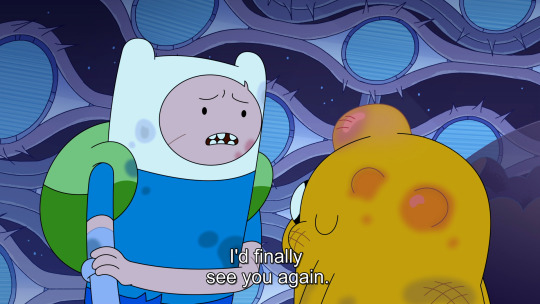
Now, I am fully-ready to be proven wrong on this. We don't even know if there's even going to BE a 'season 2' so I'm very hesitant to make predictions. The main reason why I think I could be wrong is... well, like I said at the start, it is a very odd decision to not show Simon hanging out with Finn and/or Marceline during his Happy Times Doing Better Montage. Like, on some level, there might be the thematic undercurrent of "it's good for Simon's mental health if he widens his social-circle to people who haven't known him when he was Ice King"
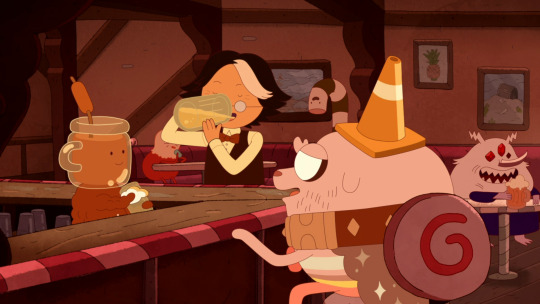
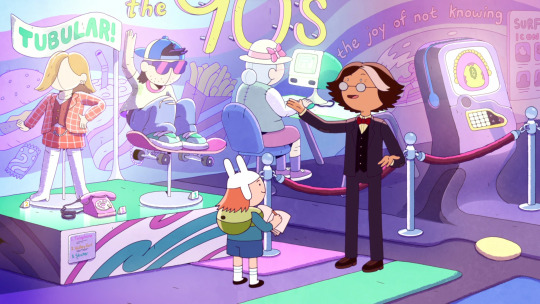
but considering how important Finn and Marcy are to him and how much they care about him - it still feels SO weird we've gotten no real specific closure for them in this series/season.
But I still just... don't know how much Simon content to expect in a hypothetical F&C Season 2 and I want to be careful with my expectations.
#nexstage#fionna and cake#adventure time#atimers#fionna & cake#fac#at#at fionna and cake#f&c#fionna and cake simon#fionna and cake series#fionna and cake show#adventure time fionna and cake#adventure time simon#simon petrikov#simon adventure time#marceline#marceline abadeer#marceline the vampire queen#finn the human#finn mertens#at finn#together again
54 notes
·
View notes
Text
As Above, So Below
I’m still trying to pinpoint exactly why the focus on “heaven is fixed and actually a paradise now!” is just so deeply unsatisfying to me. And I think I need to preface this with a bit of backstory about me, because I think that gives the rest of this essay some relevant context.
I know this isn’t relevant to my main point here, but this is a metatextual and thematically identical example of the exact thing I’m gonna lay out, because context is always helpful. So please forgive this seemingly irrelevant detour, because I promise it will be relevant by the end.
(plus, would it really be an Essay By Mittens™ without at least one baffling tangent? no, it would not!)
Tangent time!
I think everyone that follows me knows how skeptical I was... or should I say how WARY I was of the way Eileen was returned to the narrative this season. We were warned in the PREVIOUS EPISODE how much Chuck was attempting to interfere in their lives. I was accused of some very nasty things, of hating the ship, or hating the character of Eileen, or of hating Sam and not wanting them to be happy. No amount of pointing at obvious warning signs in the text, no amount of yelling about Sam’s God Wound or the absolute klaxon warning that the wound had become “quiet” and his Chuck-O-Vision Nightmares had apparently stopped seemed to matter. I was declared “wrong” and told to shut up.
And then 15.09 happened, and basically everything I’d been wary of was shown to be what actually happened, but there were still unresolved issues. Eileen doubted her own feelings and walked away. She doubted what was actually real. And at the time, I said many times that I would be thrilled to see those issues resolved by the end of the season, and for her to truly know that what she’d felt growing between her and Sam was real. And by the end of the season, despite my personal horror at her previous situation (and having that personal horror compounded by the fandom literally gaslighting me and attempting to bully me into ignoring this basic actual plot detail of this specific growth process which... in the context of what my personal objection was to accepting her return at face value in the first place having been personal trauma associated with gaslighting and manipulation...) by the time 15.18 aired, I was 100% convinced that Sam and Eileen had fully chosen each other, and felt the traumatic pain Sam suffered during that text conversation with her during the snap. She NEEDED to come back, because she had been set up to be part of Sam’s Win. They were clearly each other’s future.
The show literally put in all the work to make even *me* feel this to be True and Right and Good. And then after that point we never even hear Eileen’s name again. We never were told that she was even returned at the end of 15.19. Sam, who had been so entirely devastated by her disappearance in the previous episode that he couldn’t even process it was apparently hit with an amnesia hammer and just... never even thought about her again through a long greyscale life with a blurry baby Dean factory vaguely in the background of a single scene of his life. I can’t credit or justify how after an entire year invested in making us all truly care about Sam and Eileen and the happiness they found in each other if only the cosmos would allow them to choose each other in the end would just... erase all of that in the series finale.
Which brings me to the second tangent, which is specifically about *me,* and how I feel about the cosmic order in the television show Supernatural. Because I feel a lot about it. Probably more than most people ever did. And this is also important to understanding the main underlying point I need to make here.
Something I’ve been most looking forward to, for YEARS, about Supernatural eventually ending someday was writing a book, or a thesis, or even just organizing and compiling all my observations into a cohesive narrative specifically about the cosmology of the Supernatural universe. I’ve been cobbling together my observations and realizations about the nature of heaven, hell, purgatory, the empty, the alternate universes we’ve seen, and yes, even the cosmic function of the mundane level of the story as told by events that transpired on Earth. So of everyone watching this dumb show for the last 15 years, I don’t actually know anyone who cared more that I did about finding a satisfactory resolution and transformation of every plane of existence-- the mortal world AND the “afterlife realms” we’ve experienced on this show. And in the wake of the finale, I feel cheated out of that. Because in the end, it wasn’t about the triumph of free will and a flip of the script, it was just more of the same.
And now that I have those two preliminaries out of the way, I’ll finally get to the point. :’D
(hooray, it didn’t even take 1k words to get there for once!)
The “main stage” of Supernatural has always been Earth. It’s always been “Humanity.” At the very start, we meet two men whose lives had always been dictated to them by higher powers. At first, that “higher power” was their father who raised them in his vengeance mission, who trained them to hunt the supernatural. It was the inciting incident of the entire series, after all, their realization that forces outside of their control had irrevocably altered the course of their lives. It had forever torn down what they’d trusted in family, in personal safety, and would become something they couldn’t outrun or fight back against for long before another wave of cosmic discord would settle over them once more.
We watched this story play out in ever increasing spheres of cosmic significance, until Gabriel laid it out on the table for them in the simplest possible terms (in 5.08).
GABRIEL: You do not know my family. What you guys call the apocalypse, I used to call Sunday dinner. That's why there's no stopping this, because this isn't about a war. It's about two brothers that loved each other and betrayed each other. You'd think you'd be able to relate.
SAM: What are you talking about?
GABRIEL: You sorry sons of bitches. Why do you think you two are the vessels? Think about it. Michael, the big brother, loyal to an absent father, and Lucifer, the little brother, rebellious of Daddy's plan. You were born to this, boys. It's your destiny! It was always you! As it is in heaven, so it must be on earth. One brother has to kill the other.
DEAN: What the hell are you saying?
GABRIEL: Why do you think I've always taken such an interest in you? Because from the moment Dad flipped on the lights around here, we knew it was all gonna end with you. Always.
A long pause. SAM and DEAN look down, then at each other.
DEAN: No. That's not gonna happen.
GABRIEL: I'm sorry. But it is.
GABRIEL sighs.
GABRIEL: Guys. I wish this were a TV show. Easy answers, endings wrapped up in a bow...but this is real, and it's gonna end bloody for all of us. That's just how it's gotta be.
***
And isn’t that all even 1000x more painfully ironic that it all still happened even 10 years later? It was always going to end with them. And lol, “I wish this were a TV show” because if it was then it wouldn’t have to end bloody.
But this… was a Major Acknowledgement that the meta level of this story was consistent, and was telling us something important. It demonstrated that the Cosmic Structure Itself was the cause for Sam and Dean’s “destiny” in this story. But that’s not what the point of this story has ever been.
Nobody (including me, who is literally obsessed with this aspect of the story) has ever invested themselves in the narrative of Supernatural because they cared about the fate of the cosmic order over and above the fate of the characters who had committed to overthrowing it all, to “tearing up the pages” and writing their own destinies. I mean, we became invested because Sam, Dean, and Cas as characters took us by the hand and invited us to come along with them as they battled against fate for the good of EARTH and HUMANITY.
And certainly, Heaven being a horrific sort of eternal replay of the “highlights” of individual souls greatest hits, where free will didn’t apply as everyone was just boxed away into their individual holodecks to serve as some sort of giant Heaven Battery powering the furtherance of this narrative, this “cosmic order” that had become so powerful it dictated the events and manipulated the lives of people who still existed in the ostensible realm of free will and human life on Earth… that couldn’t stand in the end. But what the narrative (and people I’ve seen attempting to justify the finale as narratively sensible) seems to have forgotten was that all of that was Chuck’s construct to begin with. That without Chuck holding his kingdom in Heaven together, the walls of all those soul cubicles ceased to even be relevant.
After spending their entire lives to this point constantly fighting their way to the absolute pinnacle of the As Above, So Below narrative and pulling the plug on the original creator himself, Humanity should’ve triumphed. And I’d argue that it DID, through Jack restoring the missing essential “humanity” to the divine condition. And, silly me, I thought they’d achieved the promise of “paradise” heralded by Jack’s birth at last, and truly “flipped the entire script of the narrative.”
Ever since they thwarted the original apocalypse, I had hope that they would continue to achieve the same result right up the ladder. Metatron trying to fill the role of Chuck Junior hit his own narrative wall in TFW, while Dean’s battle with the Mark of Cain, and Cain telling him he was “living my life in reverse” and would succumb to destiny by killing his loved ones in the “reverse order” to Cain’s own path to downfall cemented this for me. Dean not only failed to kill any of his loved ones (you didn’t kill your own brother. why?), he SAVED them. He didn’t fulfil the prophecy in reverse, he subverted it. He UNMADE it.
Perhaps I was thinking on too grand a scale, that the ultimate inversion wouldn’t be “God is overthrown and replaced by more of the same,” but “God is overthrown and the entire order of the universe is restructured from the bottom up rather than the top down.
I’d hoped against hope that the conclusion of the narrative would be “As below, so above,” with the fundamental power of human love becoming the new foundation of the cosmic order. It never even occurred to me that “taking back the narrative to rewrite it for ourselves” was not the ultimate goal of Team Free Will, or the ultimate expression of their biggest win.
This whole “well heaven really needed to be rebuilt, there was still work to be done!” seems… irrelevant to me if they’d truly won free of the cosmic narrative. The entire structure of the universe-- including Heaven and Hell-- should’ve defaulted to the paradise state that Jack was literally born to bring to fruition. Wasn’t that the point of his entire role in the story, ultimately?
And if that wasn’t the case in the end, why did we never learn the fate of Hell? Was it just… irrelevant and unchanged after this? Or just… abandoned as a concept entirely? It’s just strange to me to put such a focus on heaven being the sole sphere of import in the end that it undercuts the essential humanity of the narrative for me.
The story itself had kept Heaven on a back burner for years, only occasionally mentioning that the structure of the place was falling further and further into disrepair with a dwindling force of angels struggling to keep the walls in place at all, that it seems like it could’ve been an afterthought at the end of the series rather than a focus so large it required the death of both main characters to make sure we all understood that Heaven Had Changed Now. Because TFW had never been fighting to make Heaven right. They’d been fighting to save the world itself, for humanity to all have a chance to live their lives as their own.
And we didn’t need to see that in the final hope they might get their own lives on Earth to explore. In the end, the fundamental narrative that Life On Earth was dictated by the cosmic structure of creation was never fully subverted. And for me, that’s the main reason I just… can’t accept the finale. It wasn’t a victory of free will and humanity, in the end it was just more of the same.
I appreciate the attempts to take the essential bones of the story we did get and apply a different polish to the surface of the skeleton, but to me it still feels like we’re looking at completely different beasts in the end. Like… to me this was as jarring a revelation as those drawing of modern animals reimagined as dinosaurs entirely based on their skeletons. Like, all along the narrative told me I was looking at a swan. They told me this skeleton they’re building out from is definitely a swan, without a doubt. I know what a swan looks like-- a graceful feather-covered bird with magnificent wings. I trusted that in the end it would be at least remotely swan-looking. And then the finale ended up looking like this
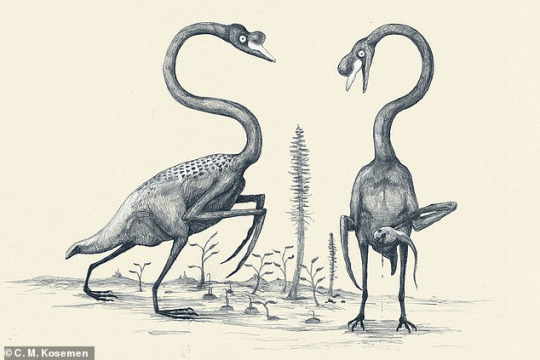
and I just don’t even know where everything went so wrong. Or maybe all along I just assumed they actually knew what a swan looked like, but weren’t sure they could actually pull it off and settled for whatever the heck this is instead. Either way, I’m actually kinda grateful to the finale for being so entirely disappointing on every level, because otherwise I probably would’ve tried to adopt the monstrosity of it anyway. And I’m really, really glad I don’t have to.
#spn 15.20#spn cosmology#heaven hell purgatory and the empty#and this is why no amount of narrative defense of the finale is capable of making me feel any better about it#i admit i thought too big... but it was all right there in the narrative to see#oh well at least all i have to do to hold on to my grandest notion of the universe is throw out the finale :'D
196 notes
·
View notes
Text
The current placing of the Twitter romance poll doesn’t particularly surprise me, but the sheer canyon between the two female romance options vs the two male options does, and I think the main thing we should take away from it is that the Kerry and River need to be given the same care and development as Panam and Judy
(Read more break because of this turning into an ESSAY JESUS WEPT)
River and Judy is one thing - according to GOG, they have a similar completion rate, Judy at 31% and River at 29%, which makes the poll a better sample study. Judy gets a bit of development through Act 1 and 2 even before her personal quests and F!V can make a move. We get to see her defrost toward V and actually flirt with her a bit and make a connection before the romance starts officially.
River mentions grabbing a beer after the gig. A really heavy gig. That’s it. He also says the same to M!V, which implies it’s not even a flirtation. He’s given a noble goal of saving Randy, but he’s written as lying to V to get them on board, and threatening Yawen to get his way, than offers a morally dubious quest resolution at the end. It calls his character into question, rather than affirming it, like Judy’s quests. The only genuine romance material during Peter Pan is Johnny crudely alluding to an attraction, but places it on V without an option to say ’no’, which removes agency from V’s that aren’t attracted to him.
And that’s not even addressing the Following the River mission, which made a not insignificant amount of people very uncomfortable with how it was executed as a romance path. River is the character I would say that would benefit most from a rework, as his personality is a nice chill guy, but his romance track is hurried and forced, and the only time V is given an opt out is at the end.
Personally I’d add a few text conversations between the Peralez mission and Peter Pan to establish his positive character more, and lay the ground work for an attraction, and make it clear how he behaves in Peter Pan is an extreme, rather than his default. Also Peter Pan is one of the most emotionally draining gigs in game, and flirting would be wildly out of place - he needs either more texts after the fact OR another gig with a lighter tone as a follow up to actually flirt with V - this would also be the place that I put the option to turn down River, so his romance had a more natural cut off point. The moment of Joss and her kids pressuring V into a relationship just needs to be cut outright, and give V the option to say her exes were women at the watertower.
Which leads to, Kerry and Panam.
Panam’s completion rate, unsurprisingly, is 42%. She’s also the only romance option that actively pursues V throughout her questline, rather than at the end. She’s plopped into the players metaphorical lap from the get go, she can say something flirty to both F!V and M!V, and she’s the only option that can pull off a ninjamance if M!V doesn’t turn her down every time. She is, gameplay wise, the easiest option to romance - as long as the player doesn’t outright betray her or choose the most stand offish dialogue option evech time, M!V will be in a romance with her.
Kerry, on the other hand, needs the player to have a decent friendship with Johnny, not fuck up the oil fields conversation, AND put off meeting Hanako long enough to even get his phone call. This is when the game, thematically at least, is telling the player to get a move on, and it shows - only 10% of players have ever finished his questline.
Simply? He needs to be earlier in the game, without the amount of hoops to jump through, to be equal with the other three characters. Johnny mentions he saw the article on Kerry during his night out. When V wakes up from Johnny’s bender in Act 2 is when Johnny should ask to go to North Oak. It would also serve as a better jumping off point for Johnny’s redemption arc as well, so when the oil field conversation does happen, his introspection can come from seeing Kerry and his bandmates have moved on from him and Samurai.
In a perfect world I’d also give V the opportunity to flirt back with Kerry in his missions. Kerry is relatively flirty towards M!V, but V doesn’t really have the opportunity to react until he’s on the balcony with Kerry, which can make the kiss feel somewhat unannounced when V has the option to do so. Alternatively, texts could come to the rescue here again and pepper them in between gigs, and give V the opportunity to be flirty in the replies.
Going forward, I hope River and Kerry are involved in the main plots for DLC, and Panam and Judy take a more background role to even it up a little. I know that fans of those characters wouldn’t agree with that in the slightest, but honestly, River and Kerry are good characters, and they deserve to have as much screen time as Judy and Panam. It might encourage players who might have chosen to skip their content to go back/start playing it, and frankly, I think that would be a win for everyone.
#Cyberpunk 2077#CP77#Panam Palmer#Judy Alvarez#River Ward#Kerry Eurodyne#I realise I'm being kind of harsh on River here#Like the dude himself is fine it's the romance that gives people a gentle attack of the creeps#Or the kids - kids are freaking nightmare fuel in this game
59 notes
·
View notes
Note
Have you been asked yet to rank Trust eps? Cos I'm asking! But your the criteria for ranking I leave to you to decide.
Ahahahaha I’ll have you know I put way too much thought into this. :-D
Ok so first of all, there is no such thing as a bad episode of Trust. The whole thing is really tightly written, every character and plot thread has a purpose, and even the episodes that I haven’t watched over and over again are important to the overall story. And a lot of the impact of the show comes from things that are cumulative over multiple episodes.
That being said, I do have favorites. Since the definitive ranking of Primo’s outfits has already been taken care of, here is my ranking from least to most favorite based on some nebulous criteria of artistic/narrative effectiveness and emotional impact, my judgement of which is obviously highly subjective and also correct.
Under the cut because this got ummm unbelievably, ridiculously long.
10. The House of Getty (episode 1)
Sorry Danny Boyle and Simon Beaufoy, the pilot is my least favorite episode. Still think it was the wrong choice to open with a flashy (and, I can tell, expensive) sequence showcasing the death of a character we literally never see again. And, look, I’m an impatient viewer. If I don’t get someone to root for/emotionally identify with/otherwise catch my interest early on in a narrative, I’ll tune out. And Old Paul is not only unlikeable--far from a mortal sin in dramatic storytelling--he’s boring. I don’t care about any of his rich people problems, and I’m not the kind of viewer who can be kept engaged just by hating someone and watching them be terrible.
Some of the secondary characters in the Getty household do have interesting plotlines, but we don’t get to learn very much about them in the first episode. And I do think things get interesting once Little Paul shows up (although I maintain that the whole episode is more interesting if we understand what the stakes are for Paul getting the money), but if I had started watching this show with no context I wouldn’t have made it past Old Paul’s pre-coital erotica listening routine.
If this had been anything other than the first episode I might not have ranked it last, but extra penalty points for leading with your least interesting characters.
9. Lone Star (episode 2)
This episode is, I think, saddled by the fact that it has to do a lot of heavy lifting in terms of exposition and setup. It mostly works because Chace is an entertaining narrator, and once we get to Italy with Gail I think things zip along at a pretty good pace. Opens with an attempted rape to show how Bad the Bad Guys are, which is...not my favorite trope.
Once again, I think a lot of the information in this episode would have worked better if episode 3 had been episode 1. (We’d already know who Berto was when Chace meets him; we’d already know about the box of guns in the apartment; we’d know when certain characters are lying.) This whole show runs on the suspense of the audience being the only party who knows what’s going on with all the characters at once; I think trading mystery for suspense here was the wrong move. I also can’t help thinking there was pressure to front-load the well-known American actors in the beginning of the show at the expense of the strongest narrative choices.
Imo the best thing about this episode is the sort of...multiple competing images of Paul that emerge. His mom sees him as an innocent victim who couldn’t possibly have planned any of this. Chace sees him as a spoiled rich kid trying to swindle his granddad. Neither one of them has the complete truth.
Next we get into some episodes that are certainly not bad, but their greatness is more on the level of some bangin’ individual scenes than a whole package.
8. John, Chapter 11 (episode 6)
Again, this isn’t a bad episode. The main reason I put it near the end of the list is that the first time through I got sort of impatient during the first half. We, the audience, by virtue of our extra-textual knowledge, know that Paul can’t be dead, and we spend about half the episode before we know what really happened to him, which felt a bit too long to me.
This episode does have some fantastic individual scenes including: Leo talking Primo down in the farmhouse, Leo and Paul’s conversation about Angelo’s death, Gail being an absolute badass, and the meeting between Salvatore and Old Paul. A lot of these scenes are essential on a thematic level, but I don’t think the episode as a whole is the most streamlined.
7. Consequences (episode 10)
I debated for a while where to put this episode because the overall feeling of 57 Chekov’s guns going off in the space of one episode is SO satisfying, and the resolutions of some of the individual plotlines are delicious. Ultimately I would have liked more space for Paul and Gail and less Old Paul being grumpy about his substitute child museum’s mediocrity (although the scene with the bad reviews is hilarious). Once again I feel like the show creators felt they had to pull the focus back to Old Paul to wrap things up and I just. don’t care.
That being said. The resolution of Primo’s storyline? SO SATISFYING. And tbh I don’t dislike the scenes that exist with Paul and Gail; even the happy scenes have this poignant tone to them. I think they were trying to deal with the fact that his irl story is just...incredibly fucking tragic, and you can see a bit of the strain showing.
6. Kodachrome (episode 7)
I know episode 7 is not one of your personal favorites, but it’s the one where I think jumping between multiple plotlines/sets of characters is used to the most satisfying dramatic effect. It has this sense of dramatic irony that feels like some Shakespearean family tragedy. The whole episode, we are hoping that Paul Jr. will finally do the thing we want him to do, which is stand up to his father. And he does it--but at the absolute worst, most selfish and destructive moment possible.
Paul Jr. may be the literal worst, but I do have compassion for him in the flashbacks, mostly because it seems painfully apparent that no matter what he does, he will never be able to please his father. But he doesn’t seem to realize this, and he keeps trying, even as it’s destroying him and his relationship with his family. Credit to Michael Esper for his performance for making me feel a smidgen of compassion for this bastard.
I think the other thing this episode shows is how both of Paul’s parents keep putting him, a child, into roles and circumstances that he shouldn’t really be in. He’s wandering around through what seem like very much adult environments with his dad and Talitha in Morocco. In the Trust version of events he’s there when Talitha ODs and is the one trying to revive her while his dad is having a breakdown in the corner. Gail seems like the more responsible parent but there’s something about her bringing Paul as her “date” on a night out, and the understanding that this is a thing that happens regularly...to me the disturbing part is not so much bringing a young kid to a party with adults but the unspoken expectation that Little Paul will fill the void of companionship that his father has left empty. (Gettys expecting Little Paul to step in to cover for the failings of his father is a repeated theme, and it even plays into the ear thing. His family has failed to pay the ransom, so this is now a problem he has to solve himself.) Combine this all with Leonardo going, um, excuse me but what the actual fuck is wrong with your family? and I think it makes a very effective episode. And the last couple minutes had me yelling NOOOOOOOO GODDAMMIT because you can see what’s going to happen and you’re just watching it unfolding like a car wreck. Also has one of my hands-down favorite scenes, of Paul and Primo in the car waiting for the ransom.
5. White Car in a Snowstorm (episode 9)
The ~ D R A M A !!! ~ This episode is an opera. I mean this whole show is dramatique but episode 9 really leans into the vivid imagery--that snowy highway in the mountains above the sea, the all-white ransom exchange, Paul clinging to the pole at the shuttered Getty gas station, some Very Serious Mobsters throwing the ransom money around like idiots in a moment where you’re encouraged to be happy along with them.
This is also one of my favorite episodes for Primo and for Primo and Paul’s weird sometimes-alliance. Primo walking away from Salvatore to go tell Paul “they always pay in the end”? Primo and Paul teaming up to argue with Salvatore about why Paul shouldn’t die? Primo being all threateny to the doctor treating Paul because somewhere deep down he is worried (that’s my take and you’ll never convince me otherwise)? Primo dressing up to fake-scab on a postal strike in order to find a misplaced severed ear? All gold.
Fun fact: the letter Gail writes to President Nixon did happen in real life, but as far as I can tell the phone call did not. The real details of who convinced Old Paul to finally pay (some) of the ransom are considerably less cinematic. They’re the same amount of sexist though!
Ok now we are getting to the top tier...
4. That’s All Folks! (episode 4)
This is definitely the episode that took me from “ok this is fun” to “oh holy shit I’m invested now.” It’s the episode where we get introduced to most of the Calabrian characters and their world. It’s also the episode where we start to realize that Primo is not just a fun antagonist but is really a parallel protagonist to Little Paul, with his own set of relationships and motivations that we start to see from his POV. (I’d argue that, with the exception of his very first scene, we’ve mostly seen Primo through other characters’ gaze up until episode 4, and this is the point where we start watching him as like, the character whose pursuit of a goal we’re following over the course of the scene.)
This episode ranks high for capturing so much of the weird mix of tones that makes Trust work. It can be very funny. (I never fail to fuckin lose it when Fifty is on the phone with Gail the first time and when he’s talking to the thoroughly unimpressed newspaper switchboard operator.) It has this weird unexpected intimacy between characters you wouldn’t think would connect with each other. (Primo and Paul, Paul and Angelo; in retrospect the arc of the relationship between Primo and Leo gets started in that scene in Salvatore’s kitchen.) And it has one of the show’s absolute best record-scratch tone shifts when Primo gets the ransom offer. I remember saying “oh FUCK” out loud the first time I watched the end of that episode, when Primo comes back to the house, visibly drunk and clearly furious. We’ve seen him be violent plenty before now in the show, but always in a controlled, calculated way. This is the first time we see his potential for out-of-control rage-fueled violence and he’s terrifying!
3. La Dolce Vita (episode 3)
I stand by my claim that this episode (with a few minor continuity adjustments) should have been the pilot. Can you imagine a title card that’s like “Rome 1973” and then away we go with Paul snorting coke and taking racy photos and jumping on cops and fucking his girlfriend in what is definitely not proper museum etiquette, and then the smash cut to Primo intimidating and robbing and murdering people? And that’s the opening of the whole show? And you’re like how are these characters connected and then they meet each other and it’s the fucking sunflower field scene??
Anyway aside from the fact that I think knowing the information in this episode would have made episodes 1 and 2 more interesting...it’s just a great fucking episode. It’s kinetic and propulsive and funny and tense and violent and features Primo’s sniper skills and his ass in those cornflower blue trousers. I rest my case.
2. Silenzio (episode 5)
I’ll be honest, I went back and forth on the top two a bunch. Silenzio is definitely my personal favorite episode, and I’d argue that it’s the best written, in terms of what it accomplishes narratively, which is to keep you emotionally invested in both Paul and Angelo trying to escape with their lives, and Primo and Leonardo hunting them down. That’s so fucking hard!! And yes some of it is great acting but it starts from the foundation of the writing. It’s just such a perfect little self-contained horror movie, and it has this profound sense of fatalism to it, because you know from the beginning (if only by virtue of only being halfway through the series) that Paul is not going to escape, and you sort of know that there is only one way this will end for Angelo. And yet they escape by the skin of their teeth so! many! times!
It’s also the episode where you see how much power the ‘Ndrangheta has over people’s lives in this community: Salvatore is like God, calling his servants to him with the church bells. Combine that with the visuals of two characters running for their lives mostly on foot through this unforgiving landscape, and you really get the sense of this environment as a harsh place where most people have a very constrained set of choices, and the claustrophobia of that. You get the sense in this episode that everyone is trapped in these expectations of violence and duty and honor. Angelo did what anyone with compassion would do, and saved Paul from what seemed like certain death, and he’s doomed for it. At the same time Primo is doing exactly what anyone would expect him to do in response to a subordinate who disobeyed him. In some ways the end of the episode feels inevitable, unsurprising, and yet they do SUCH a good job of winding up the tension until the literal last seconds of the episode, and then releasing it with a big dramatic bang. It’s so good!!
1. In the Name of the Father (episode 8)
Ok I’ll be honest the ONLY reason In the Name of the Father edged out Silenzio for the top spot is that it is really clear they pulled out all the stops in terms of making this episode feel extra heightened in a show where everything is already heightened. Like, the cinematography is different? They still use handheld a lot but I swear there are more still shots and more extreme, editorial camera angles like that shot of Francesco looking upward in church where the camera is looking down from above him. I can’t tell if they actually tweaked the color grading or if the bright white and blood red just stand out against the Calabrian color palette which is mostly earth tones, browns and greens and blues.
There are just. So many layers to this episode. The imagery! The literal sacrificial lamb at the beginning, Francesco being guided by Leonardo through an act of violence against an animal, something that I’m sure they don’t even see as violence but just part of farm life, part of survival and in this case part of a celebration, but something that fathers teach their sons how to do as part of becoming a man in this world. Paul as the metaphorical sacrificial lamb later, drawing parallels to Jesus (the lamb of God), Isaac (a father sacrificing his son), any number of martyred saints, pick your Catholic imagery. The blood of the lamb on the tree stump and Paul’s blood on the stone. The communion wafer (the body and blood of Christ) and Francesco at the end with Paul’s blood and a literal piece of his body held in his hands the same way.
And then there is like, the suspense of watching everyone marking time through the steps of this community ritual that’s supposed to be a joyful, communal celebration, while we know that there is a secret ticking away under the surface. The slow unfolding of the lie told to one person spreading to everyone in the village, and then the knowledge that Salvatore knows spreading to all the people who’ll be in trouble for that. The relationship arcs between the main Calabrian characters...not resolving, but sliding into place for the final act. Primo finally being done with Salvatore. Primo and Leo’s alliance being cemented and Leo physically stepping between Primo and Salvatore, to protect Primo. (No one ever protects Primo!! Still not over it!!!!) The confirmation celebration as a mirror of the Getty party in episode 1, the parallels drawn between the 3 Pauls and Salvatore-Primo-Francesco and how Primo reacts to being passed over as heir vs. how Paul Jr. reacts. Little Paul having two whole minutes of screen time and managing to break your heart with them. Regina! Just...Regina’s whole everything. The music going all-instrumental for an episode and having this haunting, dreamlike but still tense quality to it. And the fact that we never cut away from Calabria to another plotline gives the whole episode this hypnotic, all-encompassing quality. It’s just. SO GOOD!!!!
#fadagaski#asks answered#trust fx#long post#so so long omg#i can't believe how long i spent writing this but HERE IT IS#trust alternate watch order
70 notes
·
View notes